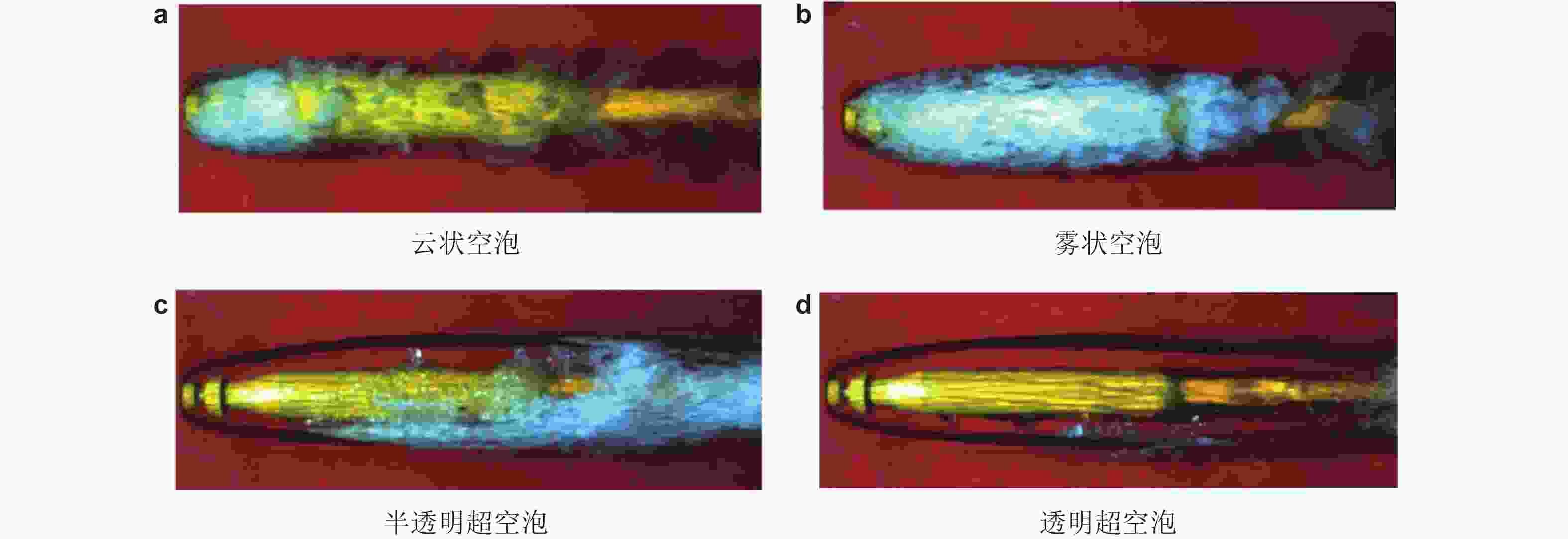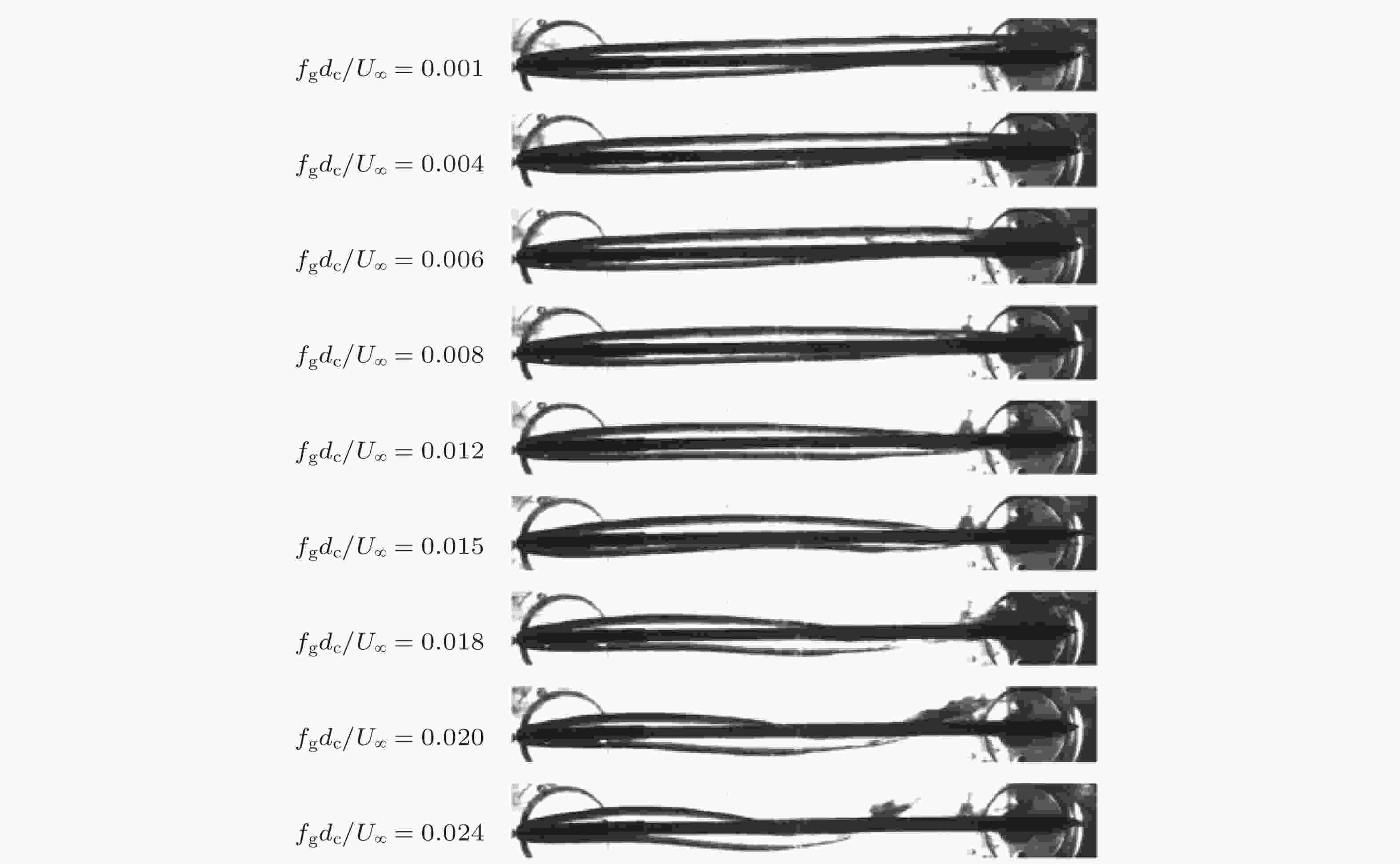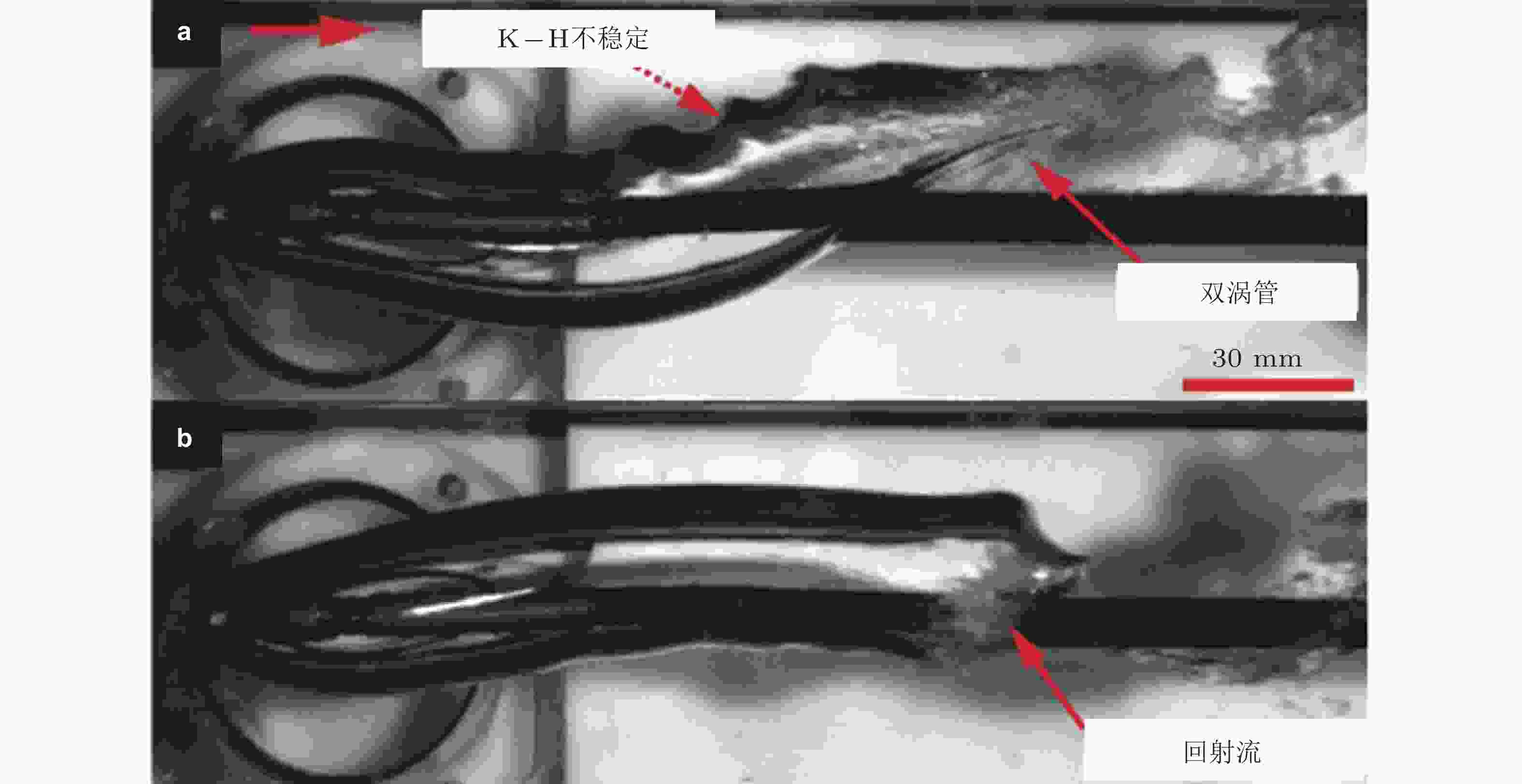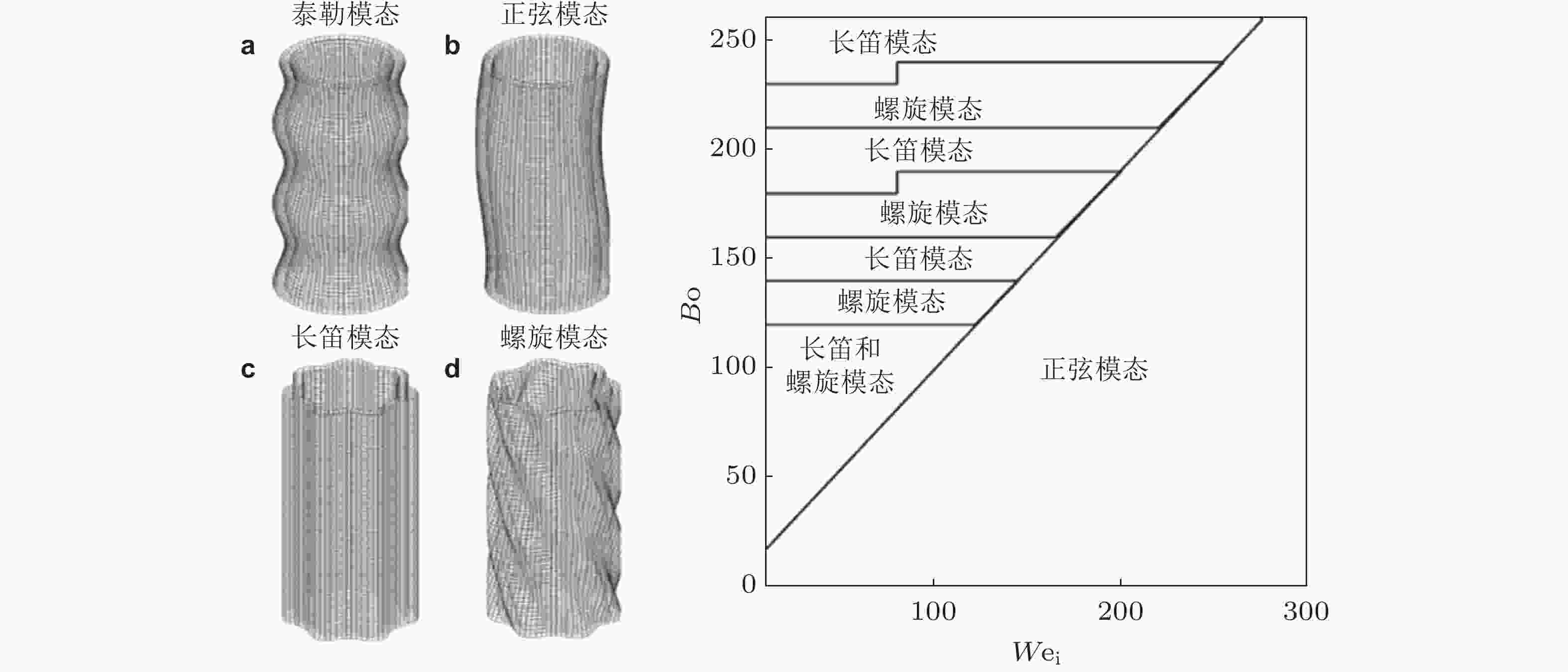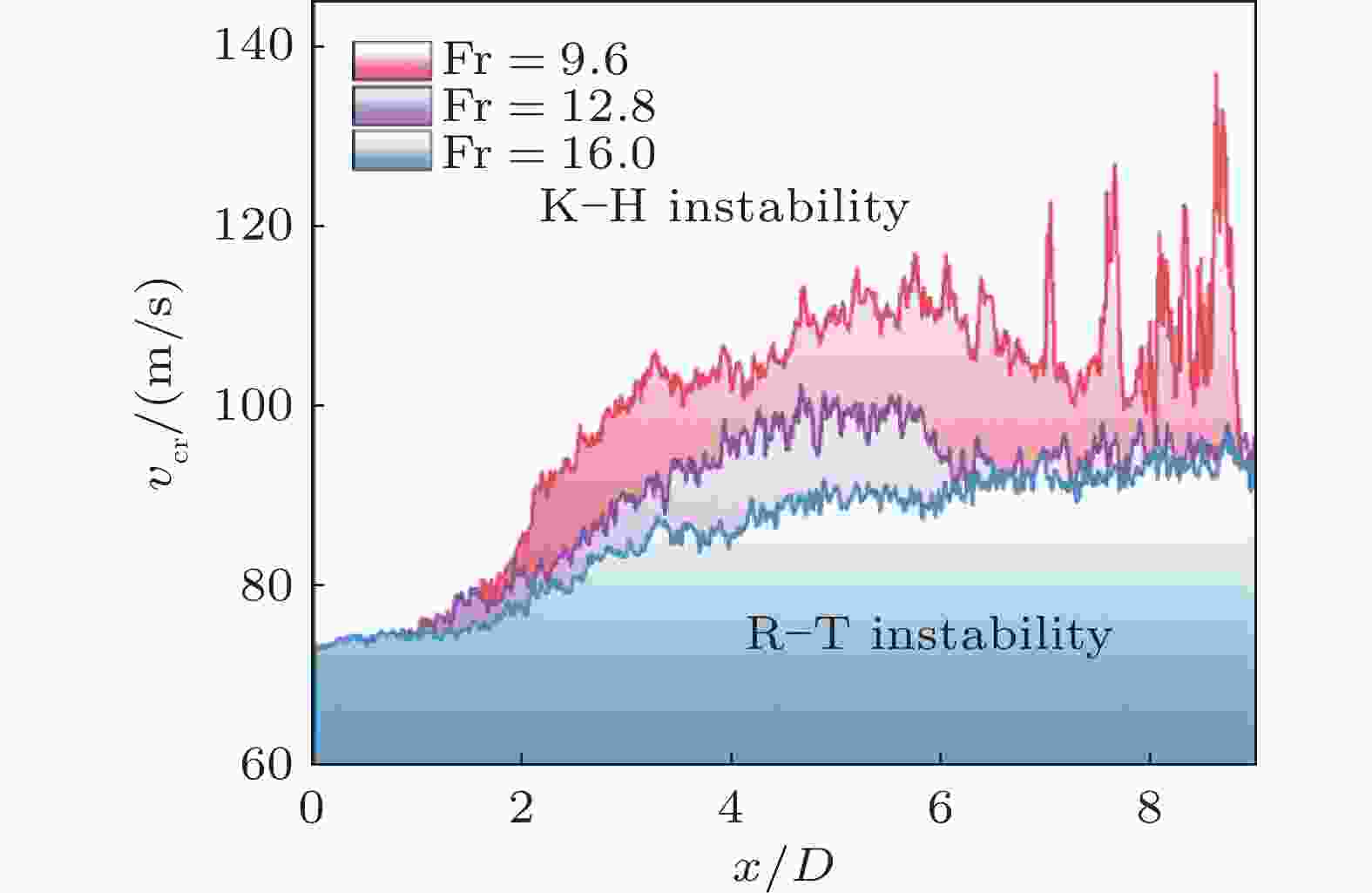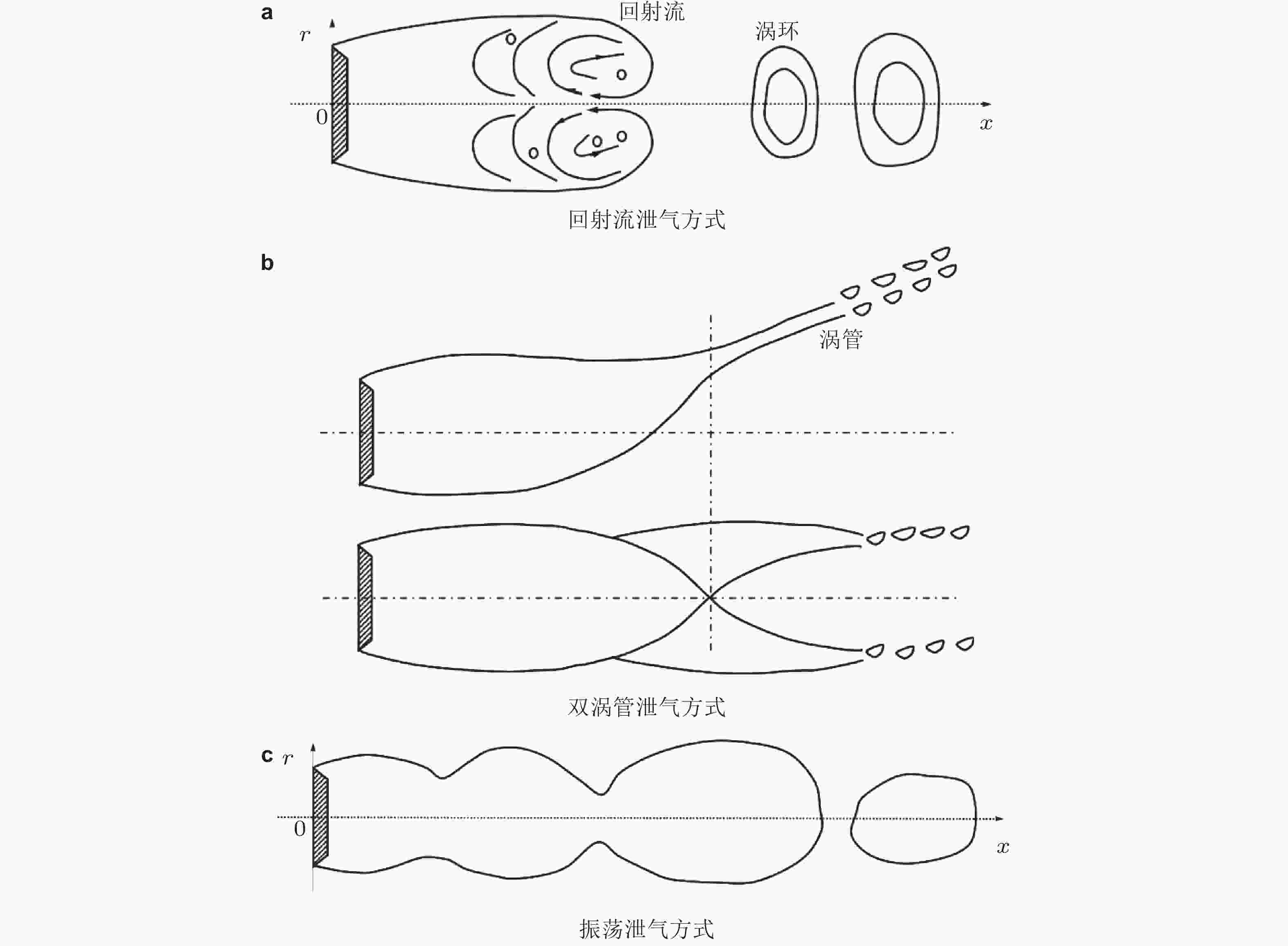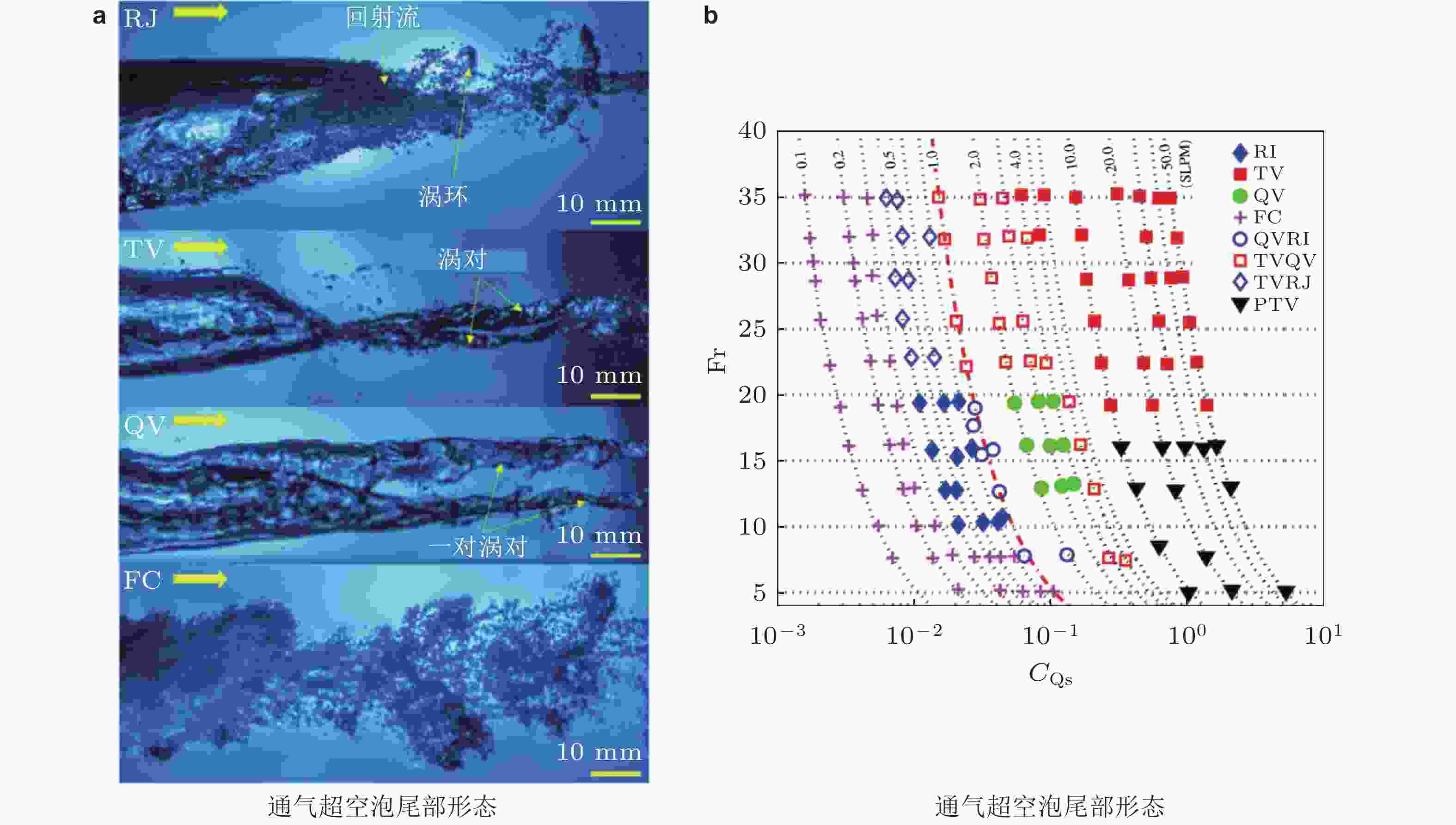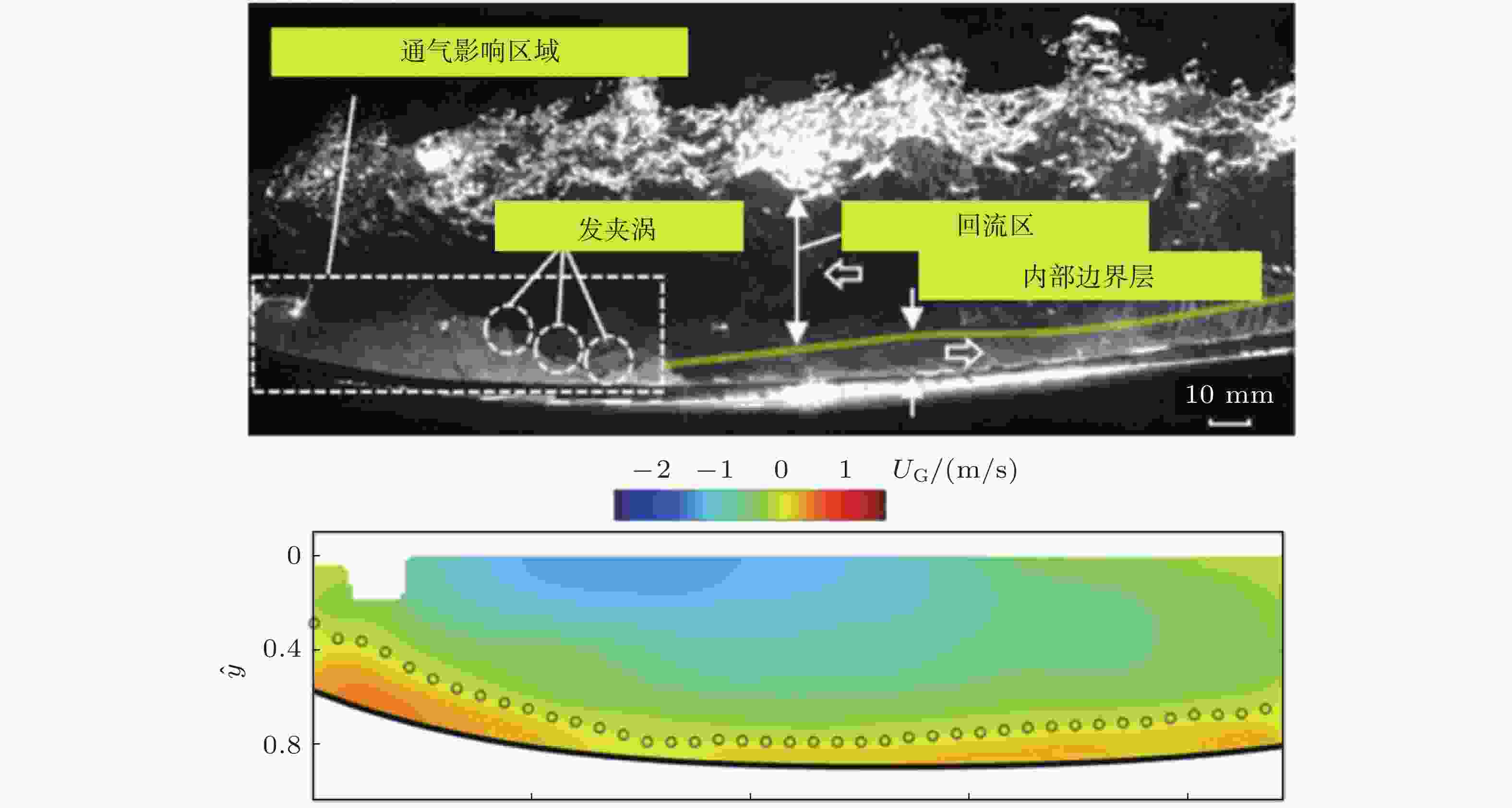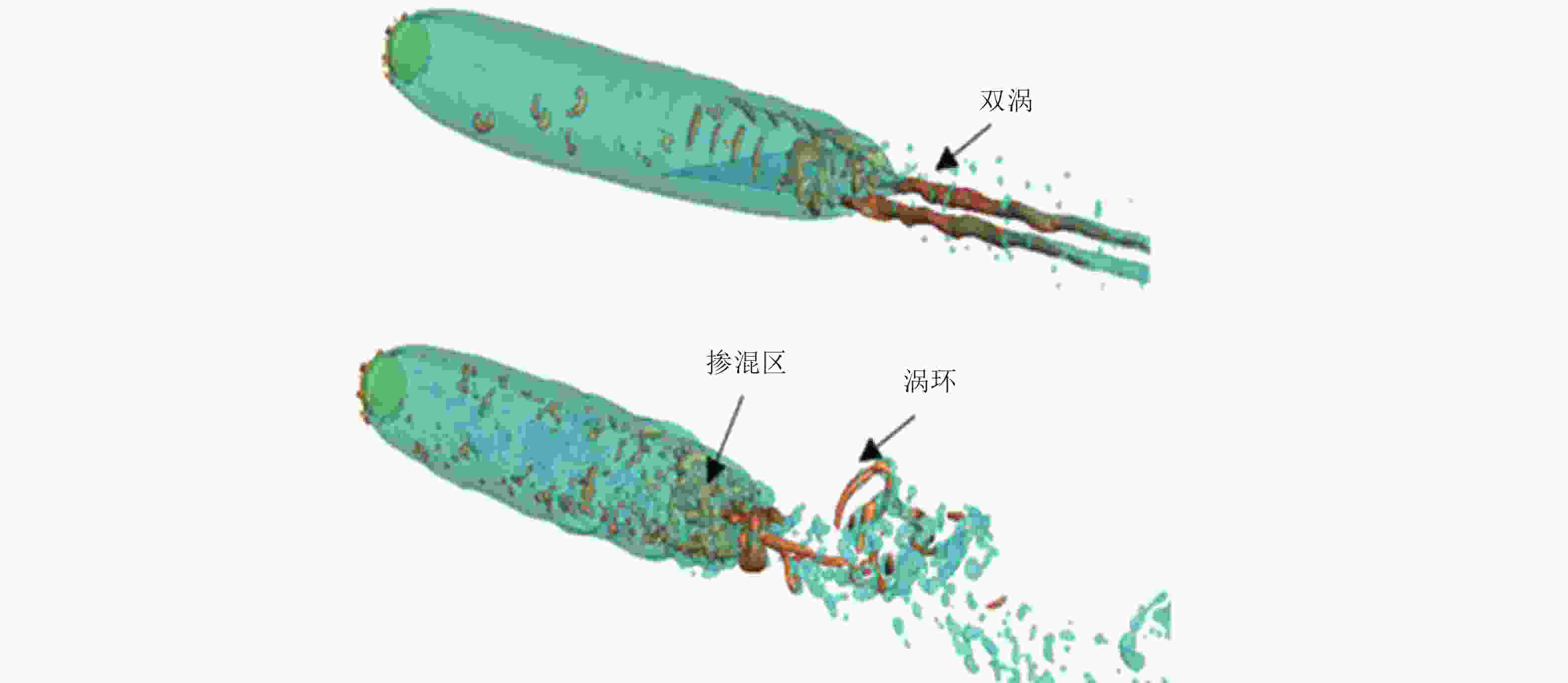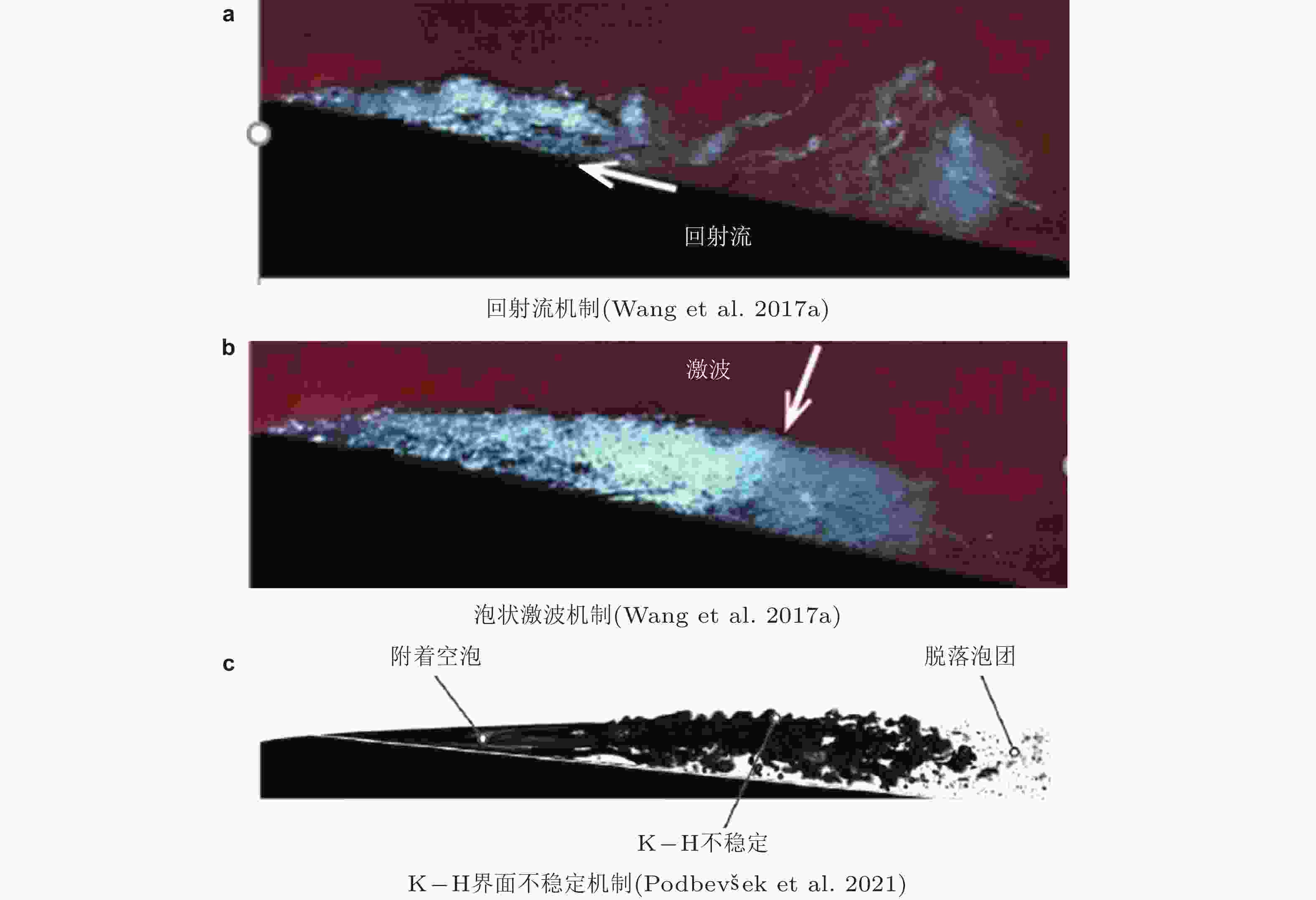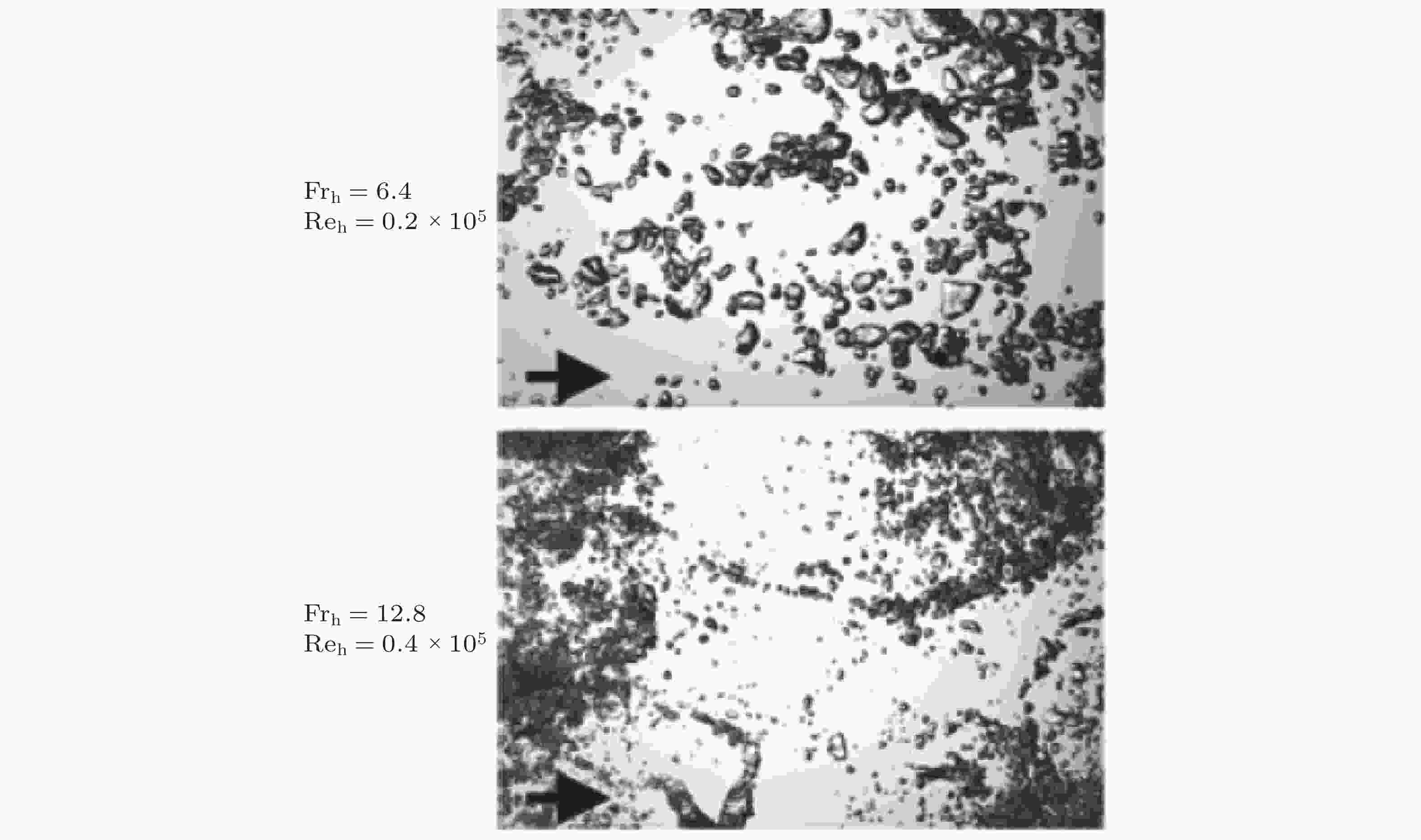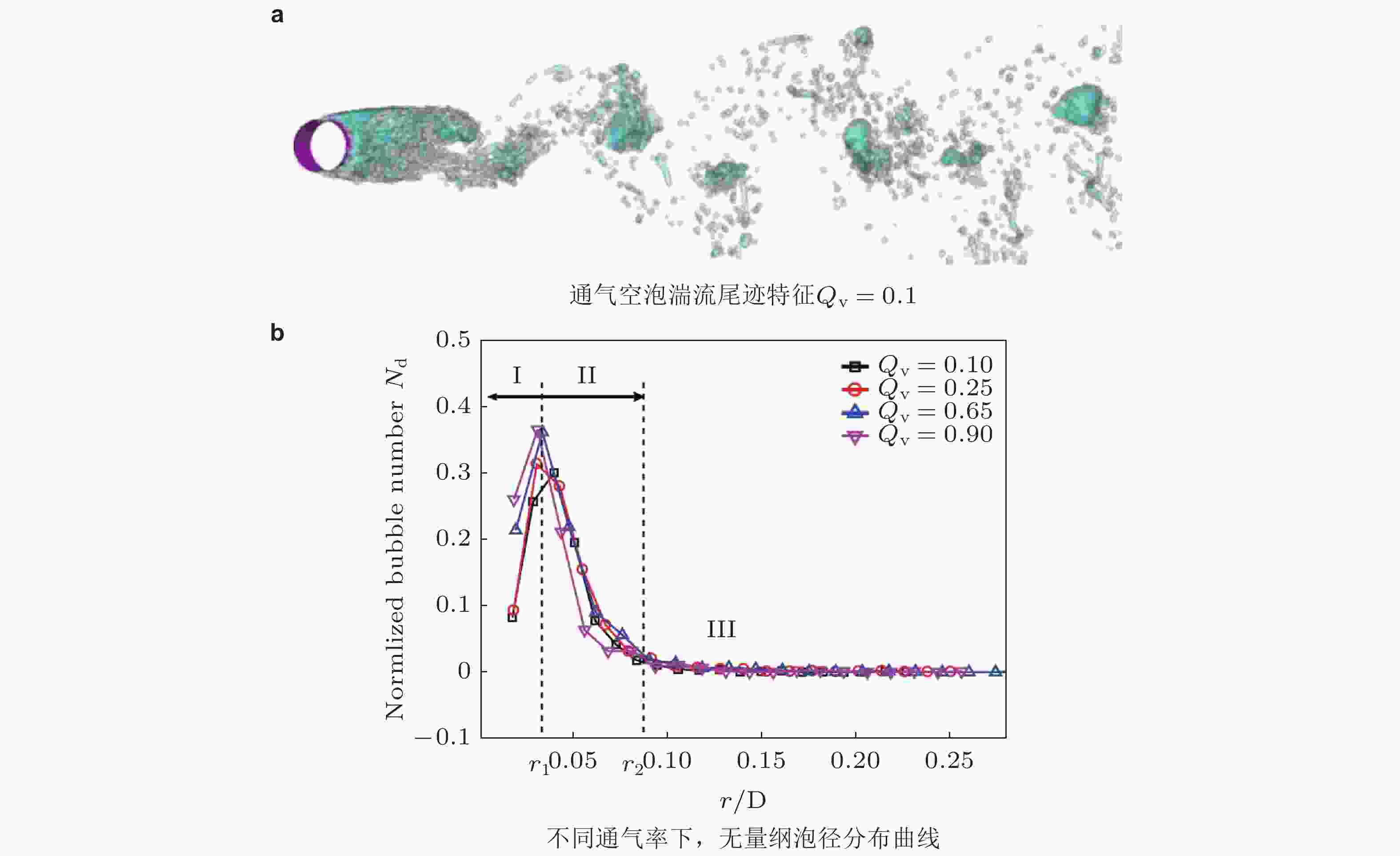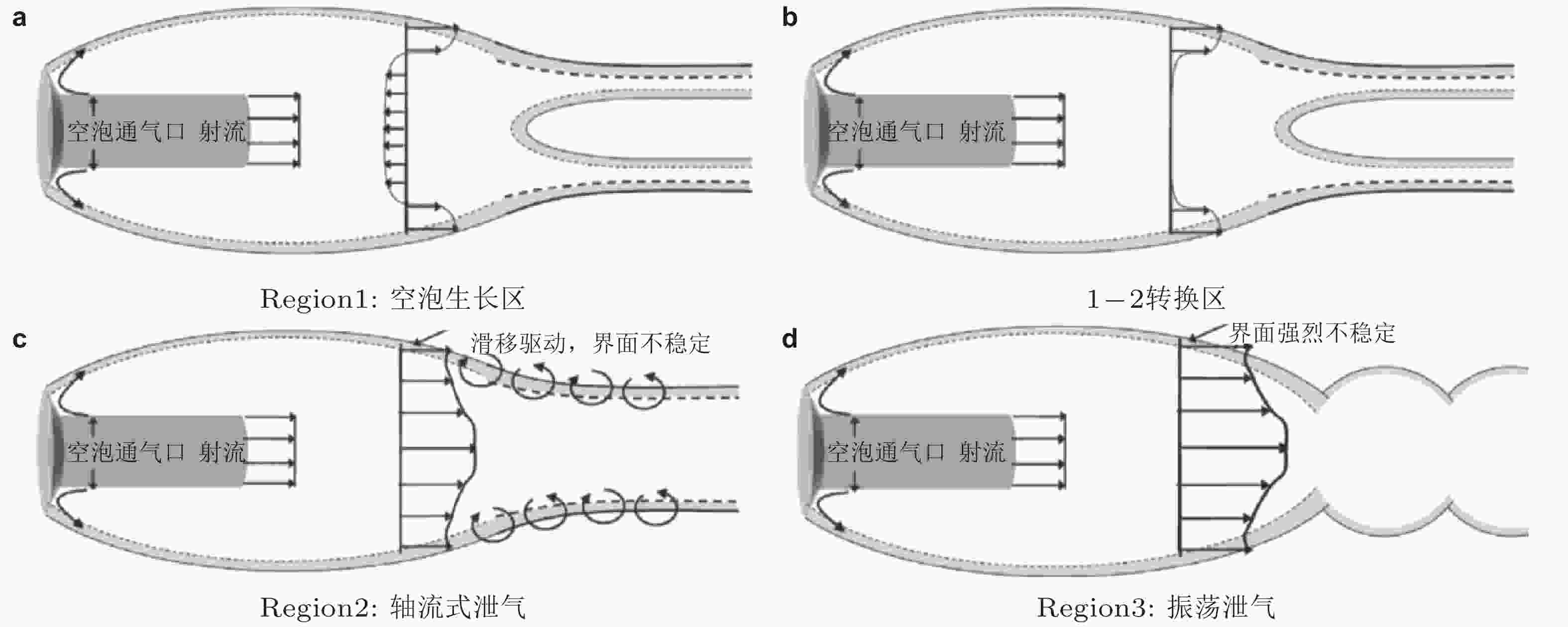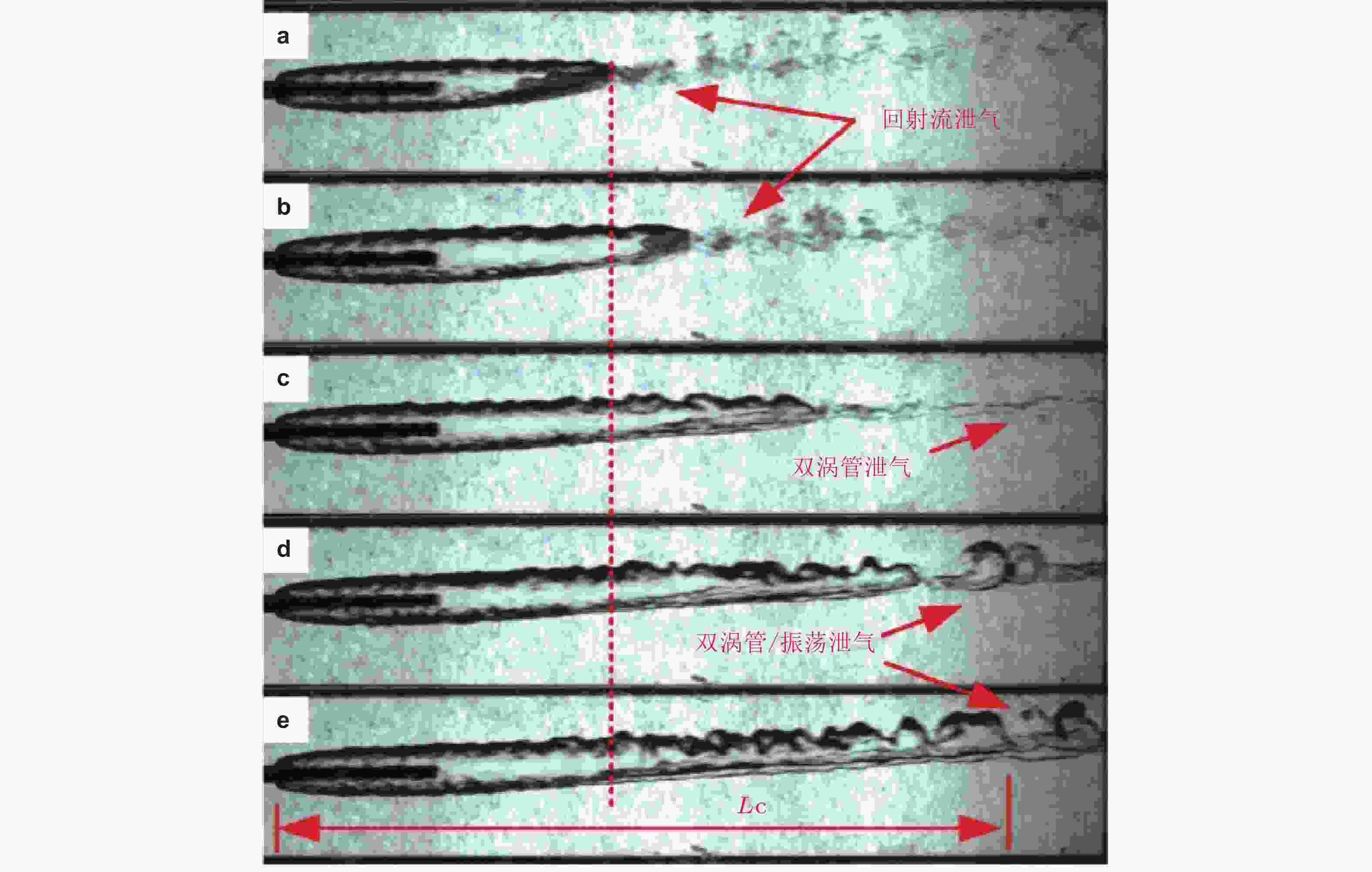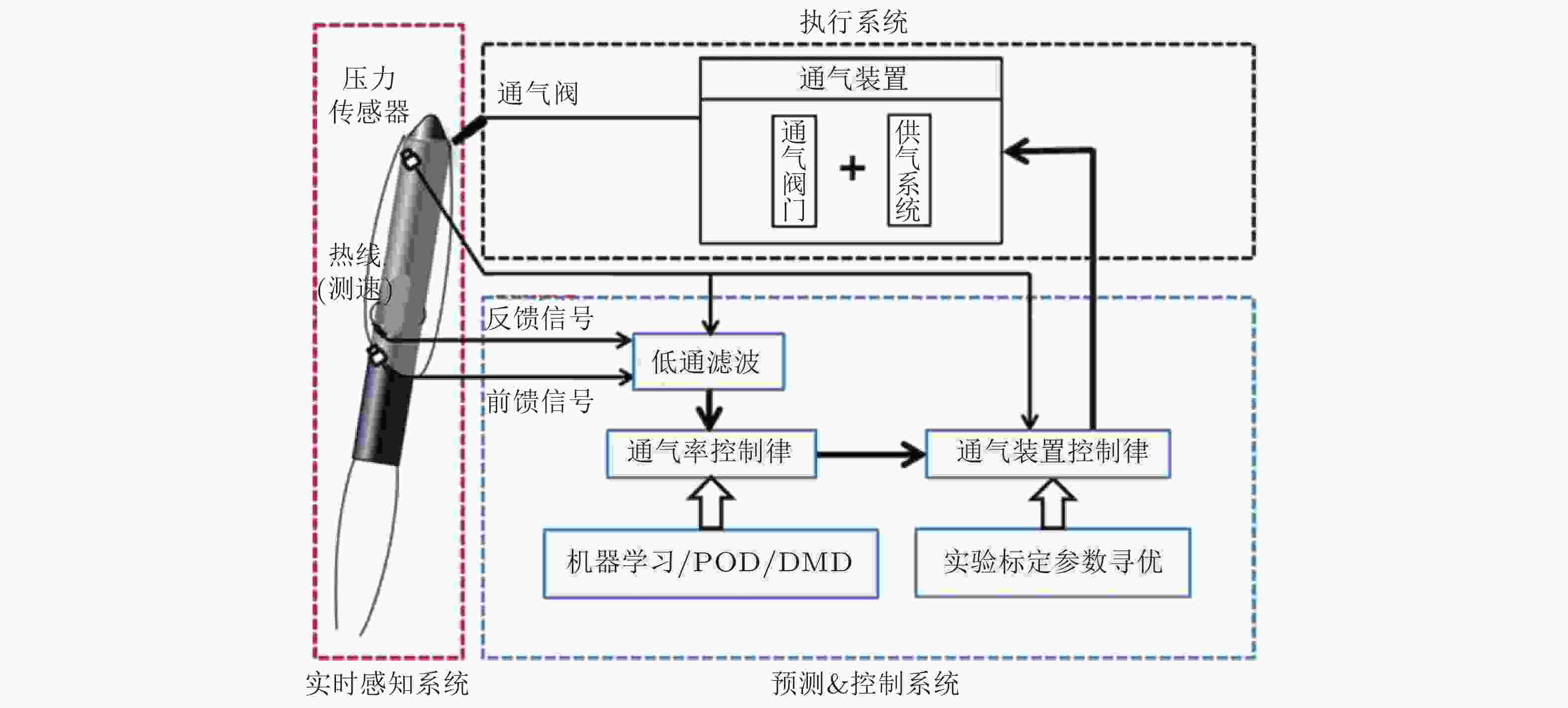Research progress on the stability mechanism and control of ventilated supercavitation
-
摘要: 通气超空泡减阻是突破传统水下速度极限, 实现高速航行的关键技术, 具有重要的工程应用价值. 超空泡航行体的航行稳定性是制约其发展的瓶颈问题, 这与通气超空泡形态的稳定性密切相关, 因此, 超空泡形态的准确预测和调控是超空泡航行体总体设计的关键之一. 本文首先介绍了关于不同环境条件下通气超空泡流动形态特征的研究, 进一步梳理了影响流动形态的关键科学问题, 包括超空泡界面特征及失稳机制、超空泡尾部闭合泄气机理和射流与空泡的耦合作用, 最后基于对通气超空泡形态的理解与认识, 阐述了实现通气超空泡流动稳定性的调控方法.Abstract: Ventilated supercavity drag reduction is a key technology to break through the traditional underwater speed limit and achieve high-speed operation of underwater vehicles, which has important engineering application value. The navigation stability of underwater vehicles is a bottleneck problem that restricts the development of supercavitating vehicles, which is closely related to the stability of ventilated supercavity. Therefore, accurate prediction and control of supercavity shape are one of the key factors in the overall design of supercavitating vehicles. This paper first introduces the research progress on the flow morphology characteristics of ventilated supercavities under different flow conditions, and further sorts out the key scientific issues that affect the flow morphology, including the characteristics and stability mechanism of the cavity interface, the closure mechanism of the supercavity, and the interaction between the jet and the supercavity. Finally, based on the understanding and recognition of the morphology of ventilated supercavities, a method for achieving flow control of ventilated supercavities is introduced.
-
图 3 通气空泡典型形态图 (王志英 2018)
图 5 不同空化水洞中通气空泡形态尺寸对比 (Shao et al. 2017)
图 6 不同来流阵风频率下通气空泡形态特征 (Lee et al. 2013)
图 7 近自由面航行空泡形态特征 (Wang et al. 2017b)
图 8 超空泡界面形态特征(Brennen 1970b)
图 9 通气超空泡流动形态特征 (Shao et al. 2018)
图 10 通气超空泡界面处流动特征 (Jiang et al. 2018)
图 11 R–T和K–H组合不稳定性下出现的不稳定模态图谱 (Vadivukkarasan & Panchagnula 2017)
图 12 不同Fr下通气空泡上界面K–H和R–T不稳定性主导机制转变的临界速度值(Yang et al. 2022a)
图 13 典型泄气方式示意图 (Semenenko 2001)
图 14 通气超空泡闭合方式图谱 (Karn et al. 2016c)
图 15 空泡内部气体流动示意图 (Savchenko Y N & Savchenko G Y 2011)
图 16 通气超空泡剪切层及其内部流动特征 (Wu et al. 2019b)
图 17 通气超空泡界面流动及流场结构特征 (王志英 2018)
图 19 通气空泡团脱落特性 (王志英 2018)
图 20 通气空泡尾部湍流气泡特征图像 (Barbaca et al. 2019)
图 21 通气空泡尾迹湍流区气泡流分布特征 (Wang et al. 2021b)
图 22 不同无量纲参数下射流与空泡闭合耦合作用形态特征划分 (Moeny et al. 2015)
图 23 射流作用下通气超空泡泄气模式示意图 (Kinzel et al. 2017)
图 24 射流作用下通气空泡形态 (周后村 2019)
图 25 通气闭环控制方案示意图 (辛万青 等 2021)
-
[1] 白涛, 蒋运华, 韩云涛. 2017. 基于水洞实验的超空泡形态的动态估计研究. 工程力学, 34 (11): 249-256 (Bai T, Jiang Y H, Han Y T. 2017. Dynamic estimation of supercavity shape based on water tunnel experiments. Engineering Mechanics, 34 (11): 249-256).Bai T, Jiang Y H, Han Y T. 2017. Dynamic estimation of supercavity shape based on water tunnel experiments. Engineering Mechanics, 34(11): 249-256 [2] 曹伟, 魏英杰, 王聪, 邹振祝, 黄文虎. 2006. 超空泡技术现状、问题与应用. 力学进展, 36 (4): 571-57 (Cao W, Wei Y J, Wang C, Zou Z Z, Huang W H. 2006. Current status, problems and application of supercavitation technology. Advance in Mechanics, 36 (4): 571-57).Cao W, Wei Y J, Wang C, Zou Z Z, Huang W H. 2006. Current status, problems and application of supercavitation technology. Advance in Mechanics, 36(4): 571-57 [3] 陈伟善, 郭则庆, 刘如石, 黄振贵. 2020. 空化器形状对超空泡射弹尾拍运动影响的数值研究. 工程力学, 37 (4): 248-256 (Chen W S, Guo Z Q, Liu R S, Huang Z G. 2020. Numerical simulation on the influence of cavitator shapes on the tail-slap of supercavitating projectiles. Engineering Mechanics, 37 (4): 248-256).Chen W S, Guo Z Q, Liu R S, Huang Z G. 2020. Numerical simulation on the influence of cavitator shapes on the tail-slap of supercavitating projectiles. Engineering Mechanics, 37(4): 248-256 [4] 陈诚. 2019. 超空泡航行器尾拍作用机理与动力学建模. [博士论文]. 西北工业大学 (Chen C. 2019. Investigation of the mechanism of tail slapping and dynamic modeling of supercavitating vehicles. [PhD Thesis]. Northwestern Polyte hyphen chnical University).Chen C. 2019. Investigation of the mechanism of tail slapping and dynamic modeling of supercavitating vehicles. [PhD Thesis]. Northwestern Polyte hyphen chnical University [5] 陈鑫. 2006. 通气空泡流研究. [博士论文]. 上海交通大学 (Chen X. 2006. An investigation of the ventilated cavitating flow. [PhD Thesis]. Shanghai Jiao Tong University).Chen X. 2006. An investigation of the ventilated cavitating flow. [PhD Thesis]. Shanghai Jiao Tong University [6] 陈学军, 王瑞, 祁晓斌, 张祯旖, 范文涛. 2023. 燃气尾喷对水下航行体通气空泡形态及表面压力的影响. 固体火箭技术, 46 (4): 521-527 (Chen X J, Wang R, Qi X B, Zhang Z Y, Fan W T. 2023. Influence of exhausted gas tail jet on ventilated cavitation shape and surface pressure of underwater vehicle. Journal of Solid Rocket Technology, 46 (4): 521-527).Chen X J, Wang R, Qi X B, Zhang Z Y, Fan W T. 2023. Influence of exhausted gas tail jet on ventilated cavitation shape and surface pressure of underwater vehicle. Journal of Solid Rocket Technology, 46(4): 521-527 [7] 党建军, 刘统军, 胥银. 2007. 尾部喷流对定常超空泡形态影响的数值研究. 鱼雷技术, 6 : 50-52 (Dang J J, Liu T J, Xu Y. 2007. Numerical simulation of influence of tail jet on steady supercavitation configuration. Torpedo Technology, 6 : 50-52).Dang J J, Liu T J, Xu Y. 2007. Numerical simulation of influence of tail jet on steady supercavitation configuration. Torpedo Technology, 6: 50-52 [8] 段磊, 王国玉, 付细能. 2014. 涡环泄气方式下通气空化的非定常流动特性研究. 兵工学报, 35 (5): 711-718 (Duan L, Wang G Y, Fu X N. 2014. Research on the unsteady characteristics of ventilated cavitating flows in the form of gas-leakage by toroidal vortex. Acta Armamentarii, 35 (5): 711-718).Duan L, Wang G Y, Fu X N. 2014. Research on the unsteady characteristics of ventilated cavitating flows in the form of gas-leakage by toroidal vortex. Acta Armamentarii, 35(5): 711-718 [9] 顾巍, 何友声, 胡天群. 2000. 轴对称体空泡流的噪声特性与空泡界面瞬态特征. 上海交通大学学报, 34 (8): 1026-1030 (Gu W, He Y S, Hu T Q. 2000. Noise feature of cavitation flows on axisymmetric bodies and transient characteristics of cavity interface. Journal of Shanghai Jiao Tong University, 34 (8): 1026-1030).Gu W, He Y S, Hu T Q. 2000. Noise feature of cavitation flows on axisymmetric bodies and transient characteristics of cavity interface. Journal of Shanghai Jiao Tong University, 34(8): 1026-1030 [10] 何友声, 刘桦, 赵岗. 1997. 二维空泡流的脉动性态研究. 力学学报, 1 : 2-8 (He Y S, Liu H, Zhao G. 1997. A study on pulsation of two-dimensional cavitating flow. Acta Mechanica Sinica, 1 : 2-8).He Y S, Liu H, Zhao G. 1997. A study on pulsation of two-dimensional cavitating flow. Acta Mechanica Sinica, 1: 2-8 [11] 胡晓, 郜冶, 彭辉. 2015. 湍流模型对空泡形态影响的数值研究. 计算力学学报, 32 (1): 129-135 (Hu X, Gao Y, Peng H. 2015. Numerical study on the influence of turbulence models on bubble morphology. Chinese Journal of Computation Mechanics, 32 (1): 129-135).Hu X, Gao Y, Peng H. 2015. Numerical study on the influence of turbulence models on bubble morphology. Chinese Journal of Computation Mechanics, 32(1): 129-135 [12] 胡勇, 陈鑫, 鲁传敬, 潘展程, 郭建红. 2008. 水下航行体尾喷燃气与通气超空泡相互作用的研究. 水动力学研究与进展A辑, 23 (4): 438-445 (Hu Y, Chen X, Lu C J, Pan Z C, Guo J H. Study on the interaction between ventilated cavitating flow and exhausted gas of an underwater vehicle. Chinese Journal of Hydrodynamic, 23 (4): 438-445).Hu Y, Chen X, Lu C J, Pan Z C, Guo J H. Study on the interaction between ventilated cavitating flow and exhausted gas of an underwater vehicle. Chinese Journal of Hydrodynamic, 23(4): 438-445 [13] 黄彪, 黄瀚锐, 刘涛涛, 张孟杰, 王国玉. 2020. 通气空泡流动特性研究现状及进展. 空气动力学学报, 38 (4): 23 (Huang B, Huang H R, Liu T T, Zhang M J, Wang G Y. Research progress and prospects of ventilated cavitating flow characteristics. Acta Aerodynamica sinica, 38 (4): 23).Huang B, Huang H R, Liu T T, Zhang M J, Wang G Y. Research progress and prospects of ventilated cavitating flow characteristics. Acta Aerodynamica sinica, 38(4): 23 [14] 黄楠, 陈志华, 王争论. 2021. 水下超声速气体射流线性稳定性研究. 推进技术, 42 (3): 10 (Huang N, Chen Z H, Wang Z L. 2021. Linear stability of underwater supersonic gas jet. Journal of Propulsion Technology, 42 (3): 10).Huang N, Chen Z H, Wang Z L. 2021. Linear stability of underwater supersonic gas jet. Journal of Propulsion Technology, 42(3): 10 [15] 孔德才, 裴金亮, 于海涛, 李岩. 2017. 绕回转航行体通气空泡末端泄气模式研究. 导弹与航天运载技术, 4 : 13-16 (Kong D C, Pei J L, Yu H T, Li Y. 2017. Research on gas leakage mechanism of ventilated cavitating flows around an axisymmetric body. Missiles and Space Vehicles, 4 : 13-16).Kong D C, Pei J L, Yu H T, Li Y. 2017. Research on gas leakage mechanism of ventilated cavitating flows around an axisymmetric body. Missiles and Space Vehicles, 4: 13-16 [16] 孔德才, 魏海鹏, 李杰, 王占莹, 尤天庆, 王凡瑜. 2024. 绕回转体空泡稳定性及流动控制研究与进展综述. 船舶力学, 28 (04): 626-636 (Kong D C, Wei H P, Li J, Wang Z Y, You T Q, Wang F Y. 2024. Review on the research of asymmetric cloud cavitation stability and flow control around revolution bodies. Journal of Ship Mechanics, 28 (04): 626-636).Kong D C, Wei H P, Li J, Wang Z Y, You T Q, Wang F Y. 2024. Review on the research of asymmetric cloud cavitation stability and flow control around revolution bodies. Journal of Ship Mechanics, 28(04): 626-636 [17] 李源, 罗喜胜. 2014. 黏性、表面张力和磁场对Rayleigh–Taylor不稳定性气泡演化影响的理论分析. 物理学报, 63 (8): 281-287 (Li Y, Luo X S. 2014. Theoretical analysis of effects of viscosity, surface tension, and magnetic field on the bubble evolution of Rayleigh–Taylor instability. Acta Phys. Sin, 63 (8): 281-287).Li Y, Luo X S. 2014. Theoretical analysis of effects of viscosity, surface tension, and magnetic field on the bubble evolution of Rayleigh–Taylor instability. Acta Phys. Sin, 63(8): 281-287 [18] 李涵, 郝亮, 张孟杰, 刘涛涛, 孔德才. 2024. 高弗劳德数下绕锥头回转体通气空泡流态特征及压力脉动特性实验研究. 实验流体力学, 38 : 1-11 (Li H, Hao L, Zhang M J, Liu T T, Kong D C. 2024. Experimental study on the flow pattern and pressure fluctuation characteristics of ventilated cavitating flows around a conical axisymmetric body at high Froude number. Journal of Experiments in Fluid Mechanics, 38 : 1-11).Li H, Hao L, Zhang M J, Liu T T, Kong D C. 2024. Experimental study on the flow pattern and pressure fluctuation characteristics of ventilated cavitating flows around a conical axisymmetric body at high Froude number. Journal of Experiments in Fluid Mechanics, 38: 1-11 [19] 李鹏, 陈炜烨, 王志, 张珂, 颜开. 2024. 高速水洞中超空泡稳定性与通气率定量试验研究. 船舶力学, 28 (04): 479-484 (Li P, Chen W Y, Wang Z, Zhang K, Yan K. 2024. Experimental study of supercavity stability and ventilation rate in high speed water tunnel. Journal of Ship Mechanics, 28 (04): 479-484).Li P, Chen W Y, Wang Z, Zhang K, Yan K. 2024. Experimental study of supercavity stability and ventilation rate in high speed water tunnel. Journal of Ship Mechanics, 28(04): 479-484 [20] 刘波. 2021. 基于射流卷吸效应的超空泡形成及影响机制研究. [硕士论文]. 国防科技大学 (Liu B. 2021. Research on supercavity formation and influence mechanism based on jet reflux effect. [Master Thesis]. National University of Defense Technology).Liu B. 2021. Research on supercavity formation and influence mechanism based on jet reflux effect. [Master Thesis]. National University of Defense Technology [21] 刘喜燕, 袁绪龙, 王鹰, 罗凯, 汪新禹. 2021. 超空泡航行体非定常流体动力延迟效应水洞试验研究. 实验流体力学, 35 (5): 26-33 (Liu X Y, Yuan X L, Wang Y, Luo K, Wang X Y. 2021. Experimental study on time-delay effect of unsteady hydrodynamics of the supercavitating vehicle in water tunnel. Journal of Experiments in Fluid Mechanics, 35 (5): 26-33).Liu X Y, Yuan X L, Wang Y, Luo K, Wang X Y. 2021. Experimental study on time-delay effect of unsteady hydrodynamics of the supercavitating vehicle in water tunnel. Journal of Experiments in Fluid Mechanics, 35(5): 26-33 [22] 鲁建华, 周东辉, 贾会霞. 2023. 近自由面串列超空泡航行体的流动特性研究. 兵器装备工程学报, 44 (8): 191-196 + 224 (Lu J H, Zhou D H, Jia H X. 2023. Study on the flow characteristics of tandem supercavitating vehicles near the free surface. Journal of Ordnance Equipment Engineering, 44 (8): 191-196 + 224).Lu J H, Zhou D H, Jia H X. 2023. Study on the flow characteristics of tandem supercavitating vehicles near the free surface. Journal of Ordnance Equipment Engineering, 44(8): 191-196 + 224 [23] 吕鹏宇, 薛亚辉, 段慧玲. 2016. 超疏水材料表面液–气界面的稳定性及演化规律. 力学进展, 46 : 201604 (Lv P Y, Xue Y H, Duan H L. 2016. Stability and evolution of liquid–gas interfaces on super-hydrophobic surfaces. Advances in Mechanics, 46 : 201604).Lv P Y, Xue Y H, Duan H L. 2016. Stability and evolution of liquid–gas interfaces on super-hydrophobic surfaces. Advances in Mechanics, 46: 201604 [24] 罗凯, 左振浩, 许海雨, 刘富强, 叶常盛, 黄闯. 2022. 高弗劳德数通气超空泡流型迟滞特性数值仿真. 哈尔滨工程大学学报, 43 (04): 495-502 (Luo K, Zuo Z H, Xu H Y, Liu F Q, Ye C S, Huang C. 2022. Numerical simulation of the hysteresis characteristics of ventilated supercavity with high Froude number. Journal of Harbin Engineering University, 43 (04): 495-502).Luo K, Zuo Z H, Xu H Y, Liu F Q, Ye C S, Huang C. 2022. Numerical simulation of the hysteresis characteristics of ventilated supercavity with high Froude number. Journal of Harbin Engineering University, 43(04): 495-502 [25] 裴譞, 王育才, 张宇文, 邓飞, 袁绪龙. 2011. 超空泡航行器舵效的水洞试验研究. 西南交通大学学报, 46 (6): 1008-1012 + 1018 (Pei X, Wang Y C, Zhang Y W, Deng F, Yuan X L. 2011. Experimental research on tail rudder efficiency of super-cavitaion vehicle. Journal of Southwest Jiao Tong University, 46 (6): 1008-1012 + 1018).Pei X, Wang Y C, Zhang Y W, Deng F, Yuan X L. 2011. Experimental research on tail rudder efficiency of super-cavitaion vehicle. Journal of Southwest Jiao Tong University, 46(6): 1008-1012 + 1018 [26] 施红辉, 周杨洁, 贾会霞, 朱棒棒. 2016. 水深和弹体长径比对超空泡弹体阻力系数及空泡形状影响的实验研究. 兵工学报, 37 (11): 2029-2036 (Shi H H, Zhou Y J, Jia H X, Zhu B B. 2016. The effects of water depth and length-to-diameter ratio on drag coefficient and cavity shape of underwater supercavitating projectiles. Acta Armamentarii, 37 (11): 2029-2036).Shi H H, Zhou Y J, Jia H X, Zhu B B. 2016. The effects of water depth and length-to-diameter ratio on drag coefficient and cavity shape of underwater supercavitating projectiles. Acta Armamentarii, 37(11): 2029-2036 [27] 时素果, 王亚东, 刘乐华, 杨晓光. 2019. 超空泡航行体运动过程尾部振荡流场试验研究. 船舶力学, 23 (8): 917-925 (Shi S G, Wang Y D, Liu L H, Yang X G. 2019. Experimental study on the trailing oscillation flow structure in the supercavitating vehicle motion. Journal of Ship Mechanics, 23 (8): 917-925).Shi S G, Wang Y D, Liu L H, Yang X G. 2019. Experimental study on the trailing oscillation flow structure in the supercavitating vehicle motion. Journal of Ship Mechanics, 23(8): 917-925 [28] 孙士明. 2014. 人工超空泡通气规律及形态研究. [硕士论文]. 中国舰船研究院 (Sun S M. 2014. A study on ventilation law of artificial supercavitation and cavity shape. [Master Thesis]. China Ship Scientific Research Center).Sun S M. 2014. A study on ventilation law of artificial supercavitation and cavity shape. [Master Thesis]. China Ship Scientific Research Center [29] 孙士明, 陈伟政, 颜开. 2014. 通气超空泡泄气机理研究. 船舶力学, 5 : 492-498 (Sun S M, Chen W Z, Yan K. 2014. Study of gas leakage mechanism of ventilated supercavities. Journal of Ship Mechanics, 5 : 492-498).Sun S M, Chen W Z, Yan K. 2014. Study of gas leakage mechanism of ventilated supercavities. Journal of Ship Mechanics, 5: 492-498 [30] 孙尧, 赵新华, 莫宏伟. 2008. 水下超高速航行体的动力学建模及控制问题研究. 哈尔滨工程大学学报, 29 (2): 144-150 (Sun Y, Zhao X H, Mo H W. 2008. Dynamic modeling and control of underwear high-speed vehicles. Journal of Harbin Engineering University, 29 (2): 144-150).Sun Y, Zhao X H, Mo H W. 2008. Dynamic modeling and control of underwear high-speed vehicles. Journal of Harbin Engineering University, 29(2): 144-150. [31] 汤柏涛, 张建宏, 高晔, 魏先利. 2023. 超空泡航行器极点配置变结构控制方法研究. 计算机测量与控制, 31 (9): 157-165 + 182 (Tang B T, Zhang J H, Gao Y, Wei X L. 2023. Study on pole assignment variable structure control method for supercavitation vehicle. Computer Measurement & Control, 31 (9): 157-165 + 182).Tang B T, Zhang J H, Gao Y, Wei X L. 2023. Study on pole assignment variable structure control method for supercavitation vehicle. Computer Measurement & Control, 31(9): 157-165 + 182 [32] 王畅畅, 黄彪, 王国玉, 张敏弟, 高德明. 2017. 附着型空穴断裂及脱落机制的实验研究. 工程力学, 34 (10): 249-256 (Wang C C, Huang B, Wang G Y, Zhang M D, Gao D M. 2017. Experimental investigation on the breakdown and shedding mechanisms of unsteady attached cavitating flows. Engineering Mechanics, 34 (10): 249-256).Wang C C, Huang B, Wang G Y, Zhang M D, Gao D M. 2017. Experimental investigation on the breakdown and shedding mechanisms of unsteady attached cavitating flows. Engineering Mechanics, 34(10): 249-256 [33] 王复峰, 王国玉, 黄彪, 王志英, 赵宇. 2016. 通气空化多相流动特性的实验与数值研究. 工程力学, 33 (9): 220-226 + 234 (Wang F F, Wang G Y, Huang B, Wang Z Y, Zhao Y. Experimental and numerical study on characteristic of ventilated cavitation multiphase flow. Engineering Mechanics, 33 (9): 220-226 + 234).Wang F F, Wang G Y, Huang B, Wang Z Y, Zhao Y. Experimental and numerical study on characteristic of ventilated cavitation multiphase flow. Engineering Mechanics, 33(9): 220-226 + 234 [34] 王海斌, 王聪, 魏英杰, 张嘉钟, 贾立平. 2007. 水下航行体通气超空泡的实验研究. 船舶力学, 4: 514-520 (Wang H B, Wang C, Wei Y J, Zhang J Z, Jia L P. 2007. Experimental investigation of ventilated supercavity of underwater bodies. Journal of Ship Mechanics, 4: 514-520). doi: 10.3969/j.issn.1007-7294.2007.04.004Wang H B, Wang C, Wei Y J, Zhang J Z, Jia L P. 2007. Experimental investigation of ventilated supercavity of underwater bodies. Journal of Ship Mechanics, 4: 514-520 doi: 10.3969/j.issn.1007-7294.2007.04.004 [35] 王千, 陆昊成, 牟泽宇, 尤天庆, 刘桦. 2024. 气液两相自由表面流动的三维形态重构研究. 力学与实践, 46 (6): 1-13 (Wang Q, Lu H C, Mu Z Y, You T Q, Liu H. 2024. Three-dimensional reconstruction of gas-liquid two-phase free surface flows. Mechanics in Engineering, 46 (6): 1-13).Wang Q, Lu H C, Mu Z Y, You T Q, Liu H. 2024. Three-dimensional reconstruction of gas-liquid two-phase free surface flows. Mechanics in Engineering, 46(6): 1-13. [36] 王威, 王聪, 杜严锋, 李聪慧. 2018. 周期性阵风流作用下通气超空泡的仿真研究. 兵工学报, 39 (9): 1772-1779 (Wang W, Wang C, Du Y F, Li C H. 2013. Simulation study of ventilated supercavity in a periodic gust flow. Acta Armamentarii, 39 (9): 1772-1779).Wang W, Wang C, Du Y F, Li C H. 2013. Simulation study of ventilated supercavity in a periodic gust flow. Acta Armamentarii, 39(9): 1772-1779 [37] 王志, 李鹏, 许统华, 徐良浩, 张国平, 陈伟政. 2016. 通气空泡内部流场结构实验研究. 船舶力学, 20 (11): 1355-1360 (Wang Z, Li P, Xu T H, Xu L H, Zhang G P, Chen W Z. 2016. Experimental research of inner flow field structure for ventilated cavity. Journal of Ship Mechanics, 20 (11): 1355-1360).Wang Z, Li P, Xu T H, Xu L H, Zhang G P, Chen W Z. 2016. Experimental research of inner flow field structure for ventilated cavity. Journal of Ship Mechanics, 20(11): 1355-1360 [38] 王志英. 2018. 通气空泡湍流旋涡特性与机理研究. [博士论文]. 北京理工大学. (Wang Z Y. 2018. Study on the characteristics and mechanism of vortex shedding in the ventilated cavitating turbulence flow. [PhD Thesis]. Beijing Institute of Technology).Wang Z Y. 2018. Study on the characteristics and mechanism of vortex shedding in the ventilated cavitating turbulence flow. [PhD Thesis]. Beijing Institute of Technology [39] 隗喜斌, 刘海军, 于开平, 盛以成, 邹经湘. 2007. 通气参数影响超空泡形态的研究. 哈尔滨商业大学学报(自然科学版), 23 (4): 442-445 (Wei X B, Liu H J, Yu K P, Sheng Y C, Zou J X. 2007. Experimental study on effect of ventilation parameters on ventilated supercavity shapes. Journal of Harbin University of Commerce(Natural Sciences Edition), 23 (4): 442-445).Wei X B, Liu H J, Yu K P, Sheng Y C, Zou J X. 2007. Experimental study on effect of ventilation parameters on ventilated supercavity shapes. Journal of Harbin University of Commerce(Natural Sciences Edition), 23(4): 442-445 [40] 万小辉, 于开平, 张广, 李振旺. 2013. 多重扰动下通气超空泡稳定性模拟研究. 兵工学报, 34 (5): 567-573 (Wan X H, Yu K P, Zhang G, Li Z W. 2013. Numerical simulation of the stability of ventilated supercavitation under various types of disturbances. Acta Armamentarii, 34 (5): 567-573).Wan X H, Yu K P, Zhang G, Li Z W. 2013. Numerical simulation of the stability of ventilated supercavitation under various types of disturbances. Acta Armamentarii, 34(5): 567-573 [41] 万初瑞, 王本龙, 刘桦. 2017. 带攻角轴对称体自然空泡流脉动特征的数值分析. 力学季刊, 38 (2): 303-310 (Wan R C, Wang B L, Liu H. Numerical simulation of fluctuating characteristics of cavitating flow around axisymmetric body at angle of attack. Chinese Quarterly of Mechanics, 38 (2): 303-310).Wan R C, Wang B L, Liu H. Numerical simulation of fluctuating characteristics of cavitating flow around axisymmetric body at angle of attack. Chinese Quarterly of Mechanics, 38(2): 303-310 [42] 向敏, 刘波, 谢泽阳, 赵小宇. 2023. 近自由面超空泡航行体多相流特性分析. 空气动力学学报, 41 (7): 64-73 (Xiang M, Liu B, Xie Z Y, Zhao X Y. 2023. Research on the multiphase flow characteristics of the near free-surface supercavitating vehicle. Acta Aerodynamic Sinica, 41 (7): 64-73).Xiang M, Liu B, Xie Z Y, Zhao X Y. 2023. Research on the multiphase flow characteristics of the near free-surface supercavitating vehicle. Acta Aerodynamic Sinica, 41(7): 64-73 [43] 辛万青, 黄彪, 魏海鹏, 郝亮, 尤天庆. 2021. 跨介质航行体流体动力调控研究进展及新构想. 导弹与航天运载技术, 384 (6): 1-6 (Xin W Q, Huang B, Wei H P, Hao L, You T Q. 2021. A progress review and new methodology of the hydrodynamic control for cross-medium vehicles. Missile and space vehicles, 384 (6): 1-6).Xin W Q, Huang B, Wei H P, Hao L, You T Q. 2021. A progress review and new methodology of the hydrodynamic control for cross-medium vehicles. Missile and space vehicles, 384(6): 1-6 [44] 许昊, 王聪, 陆宏志, 黄文虎. 2018. 水下超声速气体射流诱导尾空泡实验研究. 物理学报, 67 (1): 198-210 (Xu H, Wang C, Lu H Z, Huang W H. 2018. Experimental study on submerged supersonic gaseous jet induced tail cavity. Acta Phys. Sin, 67 (1): 198-210).Xu H, Wang C, Lu H Z, Huang W H. 2018. Experimental study on submerged supersonic gaseous jet induced tail cavity. Acta Phys. Sin, 67(1): 198-210 [45] 许海雨, 罗凯, 黄闯, 左振浩, 古鉴霄. 2021. 低弗劳德数通气超空泡初生及发展演变特性. 上海交通大学学报, 55 (8): 934-941 (Xu H Y, Luo K, Huang C, Zuo Z H, Gu J X. 2021. Variation characteristics of formation and development of ventilated supercavity at low Froude number. Journal of Shanghai Jiao Tong University, 55 (8): 934-941).Xu H Y, Luo K, Huang C, Zuo Z H, Gu J X. 2021. Variation characteristics of formation and development of ventilated supercavity at low Froude number. Journal of Shanghai Jiao Tong University, 55(8): 934-941 [46] 徐清沐, 薛雷平. 2013. 带凹槽和带凸起的圆盘空化器超空泡流数值研究. 水动力学研究与进展A辑, 28 (5): 518-525 (Xu Q M, Xue L P. 2013. Numerical study of supercavity flow of disk cavitator with grooves or convexes. Chinese Journal of Hydrodynamic, 28 (5): 518-525).Xu Q M, Xue L P. 2013. Numerical study of supercavity flow of disk cavitator with grooves or convexes. Chinese Journal of Hydrodynamic, 28(5): 518-525 [47] 徐增辉, 高经纬, 向敏, 柳养清, 黄紫光. 2024. 偏转尾射流与通气空泡耦合实验研究. 空气动力学学报, 42 : 1-11 (Xu Z H, Gao J W, Xiang M, Liu Y Q, Huang Z G. 2024. Experimental study on interaction between deflected tail jet and ventilated cavitation. Acta Aerodynamica Sinica, 42 : 1-11).Xu Z H, Gao J W, Xiang M, Liu Y Q, Huang Z G. 2024. Experimental study on interaction between deflected tail jet and ventilated cavitation. Acta Aerodynamica Sinica, 42: 1-11 [48] 颜开, 褚学森, 许晟, 冯光. 2006. 超空泡流体动力学研究进展. 船舶力学, 10 (4): 148-155 (Yan K, Chu X S, Xu S, Feng G. 2006. Research progress of supercavitation hydrodynamics. Journal of Ship Mechanics, 10 (4): 148-155).Yan K, Chu X S, Xu S, Feng G. 2006. Research progress of supercavitation hydrodynamics. Journal of Ship Mechanics, 10(4): 148-155 [49] 杨洪澜, 张嘉钟, 赵存宝, 黄文虎. 2007. 变速运动锥体超空泡形状分析与预测. 水动力学研究与进展A辑, 22 (1): 53-60 (Yang H L, Zhang J Z, Zhao C B, Huang W H. 2007. Analyse and prediction of supercavities’ shape of cone cavitor with variable motion. Chinese Journal of Hydrodynamic, 22 (1): 53-60).Yang H L, Zhang J Z, Zhao C B, Huang W H. 2007. Analyse and prediction of supercavities’ shape of cone cavitor with variable motion. Chinese Journal of Hydrodynamic, 22(1): 53-60 [50] 杨洪澜, 史文谱. 2014. 超空泡横截面独立膨胀原理解析及其应用. 计算力学学报, 31(2): 277-280 (Yang H L, Shi W P. 2014. Analyse of supercavity cross section independent expansion principle and its application. Chinese Journal of Computational Mechanics, 31(2): 277-280). doi: 10.7511/jslx201402023Yang H L, Shi W P. 2014. Analyse of supercavity cross section independent expansion principle and its application. Chinese Journal of Computational Mechanics, 31(2): 277-280 doi: 10.7511/jslx201402023 [51] 杨松默, 王刚, 曹延林, 黄忠意, 段慧玲, 吕鹏宇. 2020. 水下多级微结构液气界面的稳定性和可恢复性研究. 力学学报, 52 (2): 451-461 (Yang S M, Wang G, Cao Y L, Huang Z Y, Duan H L, Lv P Y. 2020. Stability and recoverability of liquid–gas interfaces on submerged hierarchically structured surfaces. Chinese Journal of Theoretical and Applied Mechanics, 52 (2): 451-461).Yang S M, Wang G, Cao Y L, Huang Z Y, Duan H L, Lv P Y. 2020. Stability and recoverability of liquid–gas interfaces on submerged hierarchically structured surfaces. Chinese Journal of Theoretical and Applied Mechanics, 52(2): 451-461 [52] 杨武刚, 张宇文, 邓飞, 袁绪龙, 范辉, 阚雷. 2007. 通气流量对超空泡外形特征影响实验研究. 西北工业大学学报, 25(3): 358-362 (Yang W G, Zhang Y W, Deng F, Yuan X L, Fan H, Kan L. 2007. Exploring experimentally effect of gas entrainment rate on geometrical shape of supercavity. Journal of Northwestern Polytechnical University, 25(3): 358-362). doi: 10.3969/j.issn.1000-2758.2007.03.008Yang W G, Zhang Y W, Deng F, Yuan X L, Fan H, Kan L. 2007. Exploring experimentally effect of gas entrainment rate on geometrical shape of supercavity. Journal of Northwestern Polytechnical University, 25(3): 358-362 doi: 10.3969/j.issn.1000-2758.2007.03.008 [53] 杨志龙, 田文斌, 张珍, 王志英, 王一伟. 2024. 单孔排气气泡特征识别与参数提取方法. 化工进展, 43 (2): 808-817 (Yang Z L, Tian W B, Zhang Z, Wang Z Y, Wang Y W. 2024. Geometric features recognition and parameters extraction of bubbles in single-hole air bleed. Chemical Industry and Engineering Progress, 43 (2): 808-817).Yang Z L, Tian W B, Zhang Z, Wang Z Y, Wang Y W. 2024. Geometric features recognition and parameters extraction of bubbles in single-hole air bleed. Chemical Industry and Engineering Progress, 43(2): 808-817 [54] 于开平, 隗喜斌, 蒋增辉. 2007. 俄罗斯和乌克兰超空泡减阻技术研究进展. 飞航导弹, 8 : 5-11 (Yu K P, Wei X B, Jiang Z H. 2007. Research progress on supercavitation drag reduction technology in Russia and Ukraine. Aerodynamic Missile Journal, 8 : 5-11).Yu K P, Wei X B, Jiang Z H. 2007. Research progress on supercavitation drag reduction technology in Russia and Ukraine. Aerodynamic Missile Journal, 8: 5-11 [55] 袁绪龙, 张宇文, 王育才, 邓飞, 陈伟政, 党建军. 2004a. 水下航行体通气超空泡非对称性研究. 力学学报, 36 (2): 146-150 (Yuan X L, Zhang Y W, Wang Y C, Deng F, Chen W Z, Dang J J. 2004a. On asymmetry of ventilated supercavity of underwater vehicle. Acta Mechanic Sinica, 36 (2): 146-150).Yuan X L, Zhang Y W, Wang Y C, Deng F, Chen W Z, Dang J J. 2004a. On asymmetry of ventilated supercavity of underwater vehicle. Acta Mechanic Sinica, 36(2): 146-150 [56] 袁绪龙, 张宇文, 刘乐华, 陈伟政, 邓飞. 2004b. 水下航行体通气超空泡形态实验研究. 应用力学学报, 21 (3): 33-37 (Yuan X L, Zhang Y W, Liu L H, Chen W Z, Deng F. 2004b. Experimental investigation of ventilated supercavity on underwater vehicle model. Chinese Journal of Applied Mechanics, 21 (3): 33-37).Yuan X L, Zhang Y W, Liu L H, Chen W Z, Deng F. 2004b. Experimental investigation of ventilated supercavity on underwater vehicle model. Chinese Journal of Applied Mechanics, 21(3): 33-37 [57] 张春, 王宝寿. 2022. 水下航行体超声速射流与尾空泡耦合作用初期的流场特性. 兵工学报, 43 (07): 1685-1694 (Zhang C, Wang B S. 2022 Flow field characteristics of the early-stage coupling interaction between supersonic jet and tail cavity of underwater vehicles. Acta Armamentarii, 43 (07): 1685-1694).Zhang C, Wang B S. 2022 Flow field characteristics of the early-stage coupling interaction between supersonic jet and tail cavity of underwater vehicles. Acta Armamentarii, 43(07): 1685-1694 [58] 张纪华, 张宇文, 朱灼. 2012. 通气量对超空泡生成与维持影响实验研究. 实验流体力学, 26 (2): 56-59 (Zhang J H, Zhang Y W, Zhu Z. 2012. Experimental study on critical ventilation of supercavitation generation and maintenance. Journal of Experiments in Fluid Mechanics, 26 (2): 56-59).Zhang J H, Zhang Y W, Zhu Z. 2012. Experimental study on critical ventilation of supercavitation generation and maintenance. Journal of Experiments in Fluid Mechanics, 26(2): 56-59. [59] 张琦. 2006. 超高速航行体尾部流场特性分析与试验研究. [硕士论文]. 西北工业大学 (Zhang Q. 2006. The experimental research on the characteristics of tail of high speed vehicle. [Master Thesis]. Northwestern Polytechnical University).Zhang Q. 2006. The experimental research on the characteristics of tail of high speed vehicle. [Master Thesis]. Northwestern Polytechnical University [60] 张学伟, 张嘉钟, 王聪, 魏英杰, 于开平, 隗喜斌. 2007. 通气超空泡形态及其稳定性实验研究. 哈尔滨工程大学学报, 28 (4): 381-387 (Zhang X W, Zhang J Z, Wang C, Wei Y J, Yu K P, Wei X B. 2007. Experimental research on ventilated cavitation and its stability. Journal of Harbin Engineering University, 28 (4): 381-387).Zhang X W, Zhang J Z, Wang C, Wei Y J, Yu K P, Wei X B. 2007. Experimental research on ventilated cavitation and its stability. Journal of Harbin Engineering University, 28(4): 381-387 [61] 张学伟, 张嘉钟, 魏英杰, 王聪. 2008. 通气超空泡自激振荡和受迫振荡的数值仿真研究. 振动与冲击, 27 (10): 6 (Zhang X W, Zhang J Z, Wei Y J, Wang C. 2008. Numerical simulation for self-oscillation and forced oscillation of a ventilated supercavitation. Journal of vibration and Shock, 27 (10): 6).Zhang X W, Zhang J Z, Wei Y J, Wang C. 2008. Numerical simulation for self-oscillation and forced oscillation of a ventilated supercavitation. Journal of vibration and Shock, 27(10): 6 [62] 张孝石, 许昊, 王聪, 陆宏志, 赵静. 2017. 水流冲击超声速气体射流实验研究. 物理学报, 66 (5): 197-207 (Zhang X S, Xu H, Wang C, Lu H Z, Zhao J. 2017. Experimental study on underwater supersonic gas jets in water flow. Acta Phys. Sin., 66 (5): 197-207).Zhang X S, Xu H, Wang C, Lu H Z, Zhao J. 2017. Experimental study on underwater supersonic gas jets in water flow. Acta Phys. Sin., 66(5): 197-207 [63] 赵小宇, 向敏, 刘波, 张为华. 2021a. 通气空泡与超音速尾喷流耦合作用实验研究. 国防科技大学学报, 43 (5): 53-60 (Zhao X Y, Xiang M, Liu B, Zhang W H. 2021a. Experimental study on the coupling effect of ventilated cavity and supersonic tail jet. Journal of National University of Defense Technology, 43 (5): 53-60).Zhao X Y, Xiang M, Liu B, Zhang W H. 2021a. Experimental study on the coupling effect of ventilated cavity and supersonic tail jet. Journal of National University of Defense Technology, 43(5): 53-60 [64] 赵小宇, 向敏, 张为华, 刘波, 李尚中. 2021b. 超音速尾流作用下通气空泡稳定性及闭合位置数值研究. 力学学报, 53 (12): 3298-3309 (Zhao X Y, Xiang M, Zhang W H, Liu B, Li S Z. 2021b. Numerical study on the stability and closure position of ventilated cavity with a supersonic tail jet. Acta Mechanic Sinica, 53 (12): 3298-3309).Zhao X Y, Xiang M, Zhang W H, Liu B, Li S Z. 2021b. Numerical study on the stability and closure position of ventilated cavity with a supersonic tail jet. Acta Mechanic Sinica, 53(12): 3298-3309 [65] 赵小宇. 2022. 通气空泡与燃气射流作用机理及流动控制方法研究. [博士论文]. 国防科技大学 (Zhao X Y. 2022. Research on the interaction mechanism and flow control methods for ventilated cavity with exhausted gasous jet. [PhD Thesis]. National University of Defense Technology).Zhao X Y. 2022. Research on the interaction mechanism and flow control methods for ventilated cavity with exhausted gasous jet. [PhD Thesis]. National University of Defense Technology [66] 赵新华. 2008. 水下超高速航行体动力学建模与控制研究. [博士论文]. 哈尔滨工程大学 (Zhao X H. 2008. Research on dynamic modeling and control of underwear high-speed vehicles. [PhD Thesis]. Harbin Engineering University).Zhao X H. 2008. Research on dynamic modeling and control of underwear high-speed vehicles. [PhD Thesis]. Harbin Engineering University [67] 赵新华, 孙尧, 安伟光, 莫宏伟. 2009. 超空泡航行体控制问题研究进展. 力学进展, 39 (5): 537-545 (Zhao X H, Sun Y, An W G, Mo H W. 2009. Advances in supercavitating vehicle control technology. Advance in Mechanics, 39 (5): 537-545).Zhao X H, Sun Y, An W G, Mo H W. 2009. Advances in supercavitating vehicle control technology. Advance in Mechanics, 39(5): 537-545 [68] 赵新华, 孙尧, 莫宏伟, 安伟光. 2013. 非定常通气超空泡分叉突变特性研究. 工程力学, 30 (10): 277-281 (Zhao X H, Sun Y, Mo H W, An W G. 2013. Bifurcation catastrophe characteristics for unsteady ventilated supercavity. Engineering Mechanics, 30 (10): 277-281).Zhao X H, Sun Y, Mo H W, An W G. 2013. Bifurcation catastrophe characteristics for unsteady ventilated supercavity. Engineering Mechanics, 30(10): 277-281 [69] 仲霄, 王树山, 马峰, 张敏弟. 2013. 通气超空泡内部流场PIV测试方法. 船舶力学, 17 (8): 851-857 (Zhong X, Wang S S, Ma F, Zhang M D. 2013. A PIV measuring method of flow in ventilated super-cavitation. Journal of Ship Mechanics, 17 (8): 851-857).Zhong X, Wang S S, Ma F, Zhang M D. 2013. A PIV measuring method of flow in ventilated super-cavitation. Journal of Ship Mechanics, 17(8): 851-857 [70] 周后村, 向敏, 张为华. 2017. 超空泡航行体控制面与主空泡相互作用分析. 兵工学报, 38 (5): 949-958 (Zhou H C, Xiang M, Zhang W H. 2017. Numerical research on interaction between control surfaces and main cavity of supercavitating vehicles. Acta Armamentarii, 38 (5): 949-958).Zhou H C, Xiang M, Zhang W H. 2017. Numerical research on interaction between control surfaces and main cavity of supercavitating vehicles. Acta Armamentarii, 38(5): 949-958 [71] 周后村. 2019. 多相可压空化流数值模拟方法研究. [博士论文]. 国防科技大学 (Zhou H C. 2019. Numerical simulation method for multiphase compressible cavitating flow. [PhD Thesis]. National University of Defense Technology).Zhou H C. 2019. Numerical simulation method for multiphase compressible cavitating flow. [PhD Thesis]. National University of Defense Technology [72] Aeschlimann V, Prothin S, Barre S, Djeridi H, 2012. High speed visualizations of the cavitating vortices of 2D mixing layer. Eur. J. Mech. B/Fluids, 31 (1): 171–180. [73] Amromin E. 2007. Analysis of body supercavitation in shallow water. Ocean Engineering, 34(11-12): 1602-1606. doi: 10.1016/j.oceaneng.2006.11.003 [74] Arndt R E A, Hambleton W T, Kawakami E, Amromin E L. 2009. Creation and maintenance of cavities under horizontal surfaces in steady and gust flows. Journal of Fluids Engineering, 131 (11): 111301. [75] Bai X R, Cheng H Y, Ji B. 2022. LES investigation of the noise characteristics of sheet and tip leakage vortex cavitating flow. International Journal of Multiphase Flow, 146: 103880. doi: 10.1016/j.ijmultiphaseflow.2021.103880 [76] Barbaca L, Pearce B W, Brandner P A. 2017. Experimental study of ventilated cavity flow over a 3-D wall-mounted fence. International Journal of Multiphase Flow, 97 : 10-22. [77] Barbaca L, Pearce B W, Ganesh H, Ceccio S L, Brandner P A. 2019. On the unsteady behaviour of cavity flow over a two-dimensional wall-mounted fence. Journal of Fluid Mechanics, 874: 483-525. [78] Brandner P A, Walker G J, Niekamp P N, Anderson B. 2010. An experimental investigation of cloud cavitation about a sphere. Journal of Fluid Mechanics, 656: 147-176. doi: 10.1017/S0022112010001072 [79] Brennen C. 1970a. Cavity surface wave patterns and general appearance. Journal of Fluid Mechanics, 44(1): 33-49. doi: 10.1017/S0022112070001672 [80] Brennen C. 1970b. Some cavitation experiments with dilute polymer solutions. Journal of Fluid Mechanics, 44(1): 51-63. [81] Buyvol V N. 1980. Slender cavities in flows with perturbations. Kiev Nauvoka Dunka, Russian. [82] Campbell I J, Hilborne D V. 1958. Air entrainment behind artificially inflated cavities. In: Proc. of 2nd Symp. on Naval Hydrodynamics. Office of Naval Research, Washington, DC. [83] Callenaere M, Franc J P, Michel J M, Riondet M. 2001. The cavitation induced by the development of a re-entrant jet. Journal of Fluid Mechanics, 444: 223-256. doi: 10.1017/S0022112001005420 [84] Ceccio S L. 2010. Friction drag reduction of external flows with bubble and gas injection. Annual Review of Fluid Mechanics, 42 (1): 183-203. [85] Chawla T C. 1957. The Kelvin–Helmholtz instability of the gas–liquid interface of a sonic gas jet submerged in a liquid. Journal of Fluid Mechanics, 67(3): 513-537. [86] Che B X, Chu N, Cao L N, Schmidt S J, Likhacjev D, Wu D Z. 2019. Control effect of micro vortex generators on attached cavitation instability. Physics of Fluids, 31(6): 064102. [87] Chen F, Xu A, Zhang Y D, Zeng Q K. 2020. Morphological and non-equilibrium analysis of coupled Rayleigh–Taylor–Kelvin–Helmholtz instability. Physics of Fluids, 32(10): 104111. doi: 10.1063/5.0023364 [88] Cheng S H, Quan X B, Sha Y Y, Yang Q, Wang C, Xu Y H. 2022. Experimental investigation of the underwater ventilated tail cavity at different angles of attack. Ocean Engineering, 261: 111916. doi: 10.1016/j.oceaneng.2022.111916 [89] Cheng X S, Shao X M, Zhang L X. 2019. The characteristics of unsteady cavitation around a sphere. Physics of Fluids, 31(4): 042103. doi: 10.1063/1.5087229 [90] Choe Y, Kim C. 2022. Computational investigation on ventilated supercavitating flows and its hydrodynamic characteristics around a high-speed underwater vehicle. Ocean Engineering, 249: 110865. [91] Choi J K, Ahn B K, Kim H T. 2015. A numerical and experimental study on the drag of a cavitating underwater vehicle in cavitation tunnel. International Journal of Naval Architecture and Ocean Engineering, 7(5): 888-905. doi: 10.1515/ijnaoe-2015-0062 [92] Chung J, Cho Y. 2018. Ventilated supercavitation around a moving body in a still fluid: Observation and drag measurement. Journal of Fluid Mechanics, 854: 367-419. doi: 10.1017/jfm.2018.638 [93] Cox R N, Clayden W A. 1956. Air entrainment at the rear of a steady cavity. London, UK. [94] De Vries S, Hill D F, De Schipper M A, Stive M J F. 2011. Remote sensing of surf zone waves using stereo imaging. Coastal Engineering, 58(3): 239-250. doi: 10.1016/j.coastaleng.2010.10.004 [95] Duy T N, Nguyen V T, Phan T H, Hwang H S. 2022. Numerical analysis of ventilated cavitating flow around an axisymmetric object with different discharged temperature conditions. International Journal of Heat and Mass Transfer, 197 : 123338. [96] Dzielski J, Kurdila A. 2003. A benchmark control problem for supercavitating vehicles and an initial investigation of solutions. Journal of Vibration and control, 9(7): 791-804. [97] Efros A G, 1946. Hydrodynamic theory of two-dimensional flow with cavitation. Dokl. Akad. Nauk. SSSR, 51 : 267–270. [98] Epstein L A. 1973. The characteristics of ventilated cavities and some scale effects. Proceedings of the IUTAM Symposium, 173-185, Leningrad, Russia. [99] Epstein M, Fauske H K, Kubo S, Nakamura T, Koyama K. 2001. Liquid entrainment by an expanding core disruptive accident bubble—A Kelvin/Helmholtz phenomenon. Nuclear Engineering and Design, 210(1-3): 53-77. doi: 10.1016/S0029-5493(01)00436-8 [100] Erfanian M R, Moghiman M. 2020. Experimental investigation of critical air entrainment in ventilated cavitating flow for a forward facing model. Applied Ocean Research, 97: 102089. doi: 10.1016/j.apor.2020.102089 [101] Faltinsen O M, Semenov Y A. 2008. The effect of gravity and cavitation on a hydrofoil near the free surface. Journal of Fluid Mechanics, 597: 371-394. doi: 10.1017/S0022112007009822 [102] Franc J P, Michel J M. 2004. Fundamentals of cavitation. Berlin, Springer Science and Business Media. [103] Ganesh H, Mäkiharju S A, Ceccio S L. 2016. Bubbly shock propagation as a mechanism for sheet-to cloud transition of partial cavities. Journal of Fluid Mechanics, 802 : 37–78. [104] Garabedian P R. 1956. Calculation of axially symmetric cavities and jets. Pacific Journal of Mathematics, 6: 611-684. doi: 10.2140/pjm.1956.6.611 [105] George D L, Iyer C O, Ceccio S L. 2000. Measurement of the bubbly flow beneath partial attached cavities using electrical impedance probes. J. Fluids Eng, 122(1): 151-155. doi: 10.1115/1.483237 [106] Gnanaskandan A, Mahesh K. 2016. Large eddy simulation of the transition from sheet to cloud cavitation over a wedge. International Journal of Multiphase Flow, 83: 86-102 [107] Guo J H, Lu C J, Chen Y, Cao J Y. 2010. Study of ventilated cavity morphology in different gas leakage regime. Journal of Hydrodynamics. Ser. B., 22 (5): 820-826. [108] Hao L, Kong D C, Wu Y, Liu T T, Wang G Y. 2022. Transition and gas leakage mechanisms of ventilated cavities around a conical axisymmetric body. Physical Review Fluids, 7(12): 123901. doi: 10.1103/PhysRevFluids.7.123901 [109] Hao L, Liu T T, Kong D C, Huang B, Wang G Y, Wu Y. 2023. Flow pattern regime and unsteady characteristics of ventilated cavitating flow around the axisymmetric bodies with different headforms. Physics of Fluids, 35: 124103. doi: 10.1063/5.0172642 [110] Hessenkemper H, Starke S, Atassi Y, Ziegenhein T, Lucas D. 2022. Bubble identification from images with machine learning methods. International Journal of Multiphase Flow, 155: 104169. doi: 10.1016/j.ijmultiphaseflow.2022.104169 [111] Huang B, Zhao Y, Wang G Y. 2014. Large eddy simulation of turbulent vortex-cavitation interactions in transient sheet/cloud cavitating flows. Computers & Fluids, 92: 113-124. [112] Jagdish B N, Brandon T Z X, Kwee T J, Dev A K. 2014. Experimental study of air layer sustainability for frictional drag reduction. Journal of Ship Research, 58(1): 30-42. doi: 10.5957/jsr.2014.58.1.30 [113] Ji B, Luo X, Arndt R E A, Peng X X, Wu Y L. 2015. Large eddy simulation and theoretical investigations of the transient cavitating vortical flow structure around a NACA66 hydrofoil. International Journal of Multiphase Flow, 68: 121-134. doi: 10.1016/j.ijmultiphaseflow.2014.10.008 [114] Jiang Y H, Shao S Y, Hong J R. 2018. Experimental investigation of ventilated supercavitation with gas jet cavitator. Physics of Fluids, 30(1): 012103. doi: 10.1063/1.5005549 [115] Jiang Y, Jeong S W, Ahn B K, Kim H T, Jung Y R. 2019. Experimental investigation of drag characteristics of ventilated supercavitating vehicles with different body shapes. Physics of Fluids, 31(5): 052106. [116] Karlikov V P, Reznichenko N T, Khomyakov A N, Sholomovich G I. 1987. A possible mechanism for the emergence of auto-oscillations in developed artificial cavitation flows and immersed gas jets. Fluid Dynamics, 22 (3): 392-398. [117] Karn A, Ellis C, Arndt R, Hong J R. 2015a. An integrative image measurement technique for dense bubbly flows with a wide size distribution. Chemical Engineering Science, 122: 240-249. doi: 10.1016/j.ces.2014.09.036 [118] Karn A, Ellis C, Hong J R, Arndt R E A. 2015b. Investigations into the turbulent bubbly wake of a ventilated hydrofoil: Moving toward improved turbine aeration techniques. Experimental Thermal and Fluid Science, 64: 186-195. doi: 10.1016/j.expthermflusci.2014.12.011 [119] Karn A, Arndt R E A, Hong J. 2015c. Dependence of supercavity closure upon flow unsteadiness. Experimental Thermal and Fluid Science, 68: 493-498. doi: 10.1016/j.expthermflusci.2015.06.011 [120] Karn A, Shao S, Arndt R E A, Hong J R. 2016a. Bubble coalescence and breakup in turbulent bubbly wake of a ventilated hydrofoil. Experimental Thermal and Fluid Science, 70: 397-407. [121] Karn A, Arndt R E A, Hong J. 2016b. Gas entrainment behaviors in the formation andcollapse of a ventilated supercavity. Exp. Therm. Fluid Sci., 79: 294-300. doi: 10.1016/j.expthermflusci.2016.08.003 [122] Karn A, Arndt R E A, Hong J R. 2016c. An experimental investigation into supercavity closure mechanisms. Journal of Fluid Mechanics, 789: 259-284. doi: 10.1017/jfm.2015.680 [123] Karn A, Rosiejka B. 2017. Air entrainment characteristics of artificial supercavities for free and constrained closure models. Experimental Thermal and Fluid Science, 81: 364-369. doi: 10.1016/j.expthermflusci.2016.10.003 [124] Kawakami E, Arndt R E. 2011. Investigation of the behavior of ventilated supercavities. Journal of Fluids Engineering, 133 (9): 091305. [125] Kinzel M P, Krane M H, Kirschner I N, Moeny M J. 2017. A numerical assessment of the interaction of a supercavitating flow with a gas jet. Ocean Engineering, 136: 304-313. [126] Kinzel M P, Lindau J W, Kunz R F. 2021. Gas entrainment from gaseous supercavities: Insight based on numerical simulation. Ocean Engineering, 221 : 108544. [127] Kinzel M, Lindau J, Kunz R. 2009. A level-set approach for compressible, multiphase fluid flows with mass transfer. In 19th AIAA Computational Fluid Dynamics, 4152. [128] Kirschner I N, Moeny M J, Krane M H, Kinzel M P. 2015. Jet-supercavity interaction: Insights from physics analysis. Journal of Physics: Conference Series, 656(1): 012156. [129] Kravtsova A Y, Markovich D M, Pervunin K S, Timoshevskiy M V, Hanjalić K. 2014. High-speed visualization and PIV measurements of cavitating flows around a semi-circular leading-edge flat plate and NACA0015 hydrofoil. International Journal of Multiphase Flow, 60: 119-134. doi: 10.1016/j.ijmultiphaseflow.2013.12.004 [130] Kubota A, Kato H, Yamauchi H, Maeda M. 1989. Unsteady structure measurement of cloud cavitation on a foil section using conditional sampling technique. Journal of Fluids Engineering, 111(2): 204-210. doi: 10.1115/1.3243624 [131] Kuklinski R, Castano J, Henoch C. 2001. Experimental study of ventilated cavities on dynamic test model. http://resolver.caltech.edu/cav2001:sessionB3.004. [132] Kuklinski R. 2006. Experimental studies in the control of cavitating bodies. AIAA Guidance, Navigation, and Control Conference and Exhibit, 6443. [133] Kulkarni S S, Pratap R. 2000. Studies on the dynamics of a supercavitating projectile. Applied Mathematical Modelling, 24(2): 113-129. [134] Kumar S S, Karn A, Arndt R E A, Hong J R. 2017. Internal flow measurements of drop impacting a solid surface. Experiments in Fluids, 58(3): 12. doi: 10.1007/s00348-016-2293-7 [135] Kolmogorov A N. 1949. On the breakage of drops in a turbulent flow. Dokl. Akad. Nauk SSSR, 66 (5): 825. [136] Kozlov I I, Prokof'ev V V. 2001. Gas entrainment from a ventilated cavity with a negative cavitation number. Fluid Dynamics, 36(5): 751-763. doi: 10.1023/A:1013072902438 [137] Lee S J, Kawakami E, Arndt R E A. 2013. Investigation of the behavior of ventilated supercavities in a periodic gust flow. Journal of Fluids Engineering, 135(8): 081301. doi: 10.1115/1.4024382 [138] Lee S J, Paik B G, Arndt R E A. 2019. Morphological changes of ventilated supercavities in continuous and discrete incident gust flows. Ocean Engineering, 172: 1-8. doi: 10.1016/j.oceaneng.2018.11.032 [139] Liu B, Xiang M, Xie Z Y, Zhang W H. 2023a. On ventilated supercavities moving horizontally near free surface. Ocean Engineering, 267: 113229. [140] Liu H, Xiao Z L, Shen L. 2023b. Simulation-based study of low-Reynolds-number flow around a ventilated cavity. Journal of Fluid Mechanics, 966(A20): 1-44. [141] Lin S P. 1981. Stability of a viscous liquid curtain. Journal of Fluid Mechanics, 104: 111-118. doi: 10.1017/S002211208100284X [142] Liu T T, Huang B, Wang G Y, Zhang M D, Gao D M. 2017. Experimental investigation of the flow pattern for ventilated partial cavitating flows with effect of Froude number and gas entrainment. Ocean Engineering, 129: 343-351. [143] Liu T T, Huang B, Wang G Y, Zhang M D. 2018. Experimental investigation of ventilated partial cavitating flows with special emphasis on flow pattern regime and unsteady shedding behavior around an axisymmetric body at different angles of attack. Ocean Engineering, 147: 289-303. doi: 10.1016/j.oceaneng.2017.10.039 [144] Liu Y Q, Wang B L. 2019. Dynamics and surface stability of a cylindrical cavitation bubble in a rectilinear vortex. Journal of Fluid Mechanics, 865: 963-992. doi: 10.1017/jfm.2019.103 [145] Liu Y Q, Zhang H, Zhang W, Wang B L. 2023c. Bubble size distribution at early stage of hydrodynamic cloud cavitation. Physics of Fluids, 35: 063305. doi: 10.1063/5.0154309 [146] Logvinovich G V. 1969. Hydrodynamics of flow with free boundaries. Kiev, Naukova Dumka, 208. [147] Lv Y F, Zhang M J, Liu T T, Chen J, Huang B, Hao L. 2021. Physical and numerical study on the transition of gas leakage regime of ventilated cavitating flow. Ocean Engineering, 239 : 109861. [148] Maiga M A, Coutier-Delgosha O. 2022. Analysis of the re-entrant jet to twin vortex flow regimes transition in ventilated cavitation. European Journal of Mechanics-B/Fluids, 94: 375-384. doi: 10.1016/j.euromechflu.2022.03.010 [149] Mäkiharju S A, Elbing B R, Wiggins A, Schinasi S, Vanden-Broeck J M, Perlin M, Dowling D R, Ceccio S L. 2013. On the scaling of air entrainment from a ventilated partial cavity. Journal of Fluid Mechanics, 732: 47-76. doi: 10.1017/jfm.2013.387 [150] Mäkiharju S A, Ganesh H, Ceccio S L. 2017a. The dynamics of partial cavity formation, shedding and the influence of dissolved and injected non-condensable gas. Journal of Fluid Mechanics, 829: 420-458. doi: 10.1017/jfm.2017.569 [151] Mäkiharju S A, Lee I H R, Filip G P, Maki K J, Ceccio S L. 2017b. The topology of gas jets injected beneath a surface and subject to liquid cross-flow. Journal of Fluid Mechanics, 818: 141-183 doi: 10.1017/jfm.2017.98 [152] Matveev K I. 2007. Three-dimensional wave patterns in long air cavities on a horizontal plane. Ocean Engineering, 34(13): 1882-1891. doi: 10.1016/j.oceaneng.2006.08.015 [153] Moeny M J, Krane M H, Kirschner I N, Kinzel M P. 2015. Jet-supercavity interaction: Insights from experiments. Journal of Physics: Conference Series, 656(1): 012162. [154] Mirzaei M, Taghvaei H. 2019. A novel configuration optimization for high-speed ventilated supercavitating vehicles. Ocean Engineering, 179: 13-21. [155] Moghimi M, Nouri N M, Molavi E. 2017. Experimental investigation on supercavitating flow over parabolic cavitators. Journal of Applied Fluid Mechanics, 10(1): 95-102. doi: 10.18869/acadpub.jafm.73.238.26678 [156] Moltani A A, Pasandidehfard M, Erfanian M R. 2023. Experimental and numerical study of free surface effect on the ventilated cavitating flow around a surface vehicle model. Ocean Engineering, 268: 113413. doi: 10.1016/j.oceaneng.2022.113413 [157] Moroz V, Kochin V, Semenenko V, Naumova O. 2023. Formation and development of ventilated supercavity past the disk–cavitator in accelerated motion. Mechanics and Advanced Technologies, 7(2): 160-171. [158] Murai Y. 2014. Frictional drag reduction by bubble injection. Experiments in Fluids, 55: 1773. [159] Park S, Choe W, Lee H, Park J Y, Kim J, Moon S Y, Cvelbar U. 2021. Stabilization of liquid instabilities with ionized gas jets. Nature, 592 : 49-53. [160] Paryshev E V. 2006. Approximate mathematical models in high-speed hydrodynamics. J. Eng. Math, 55: 41-64. doi: 10.1007/s10665-005-9026-x [161] Peng X X, Zhang L X, Wang B L, Xu L H, Song M T, Cao Y T, Liu Y W, Hong F W, Yan K. 2019. Study of tip vortex cavitation inception and vortex singing. Journal of Hydrodynamics, 31(6): 1170-1177. doi: 10.1007/s42241-019-0091-4 [162] Pennings P C, Bosschers J, Westerweel J, van Terwisga T J C. 2015. Dynamics of isolated vortex cavitation. Journal of Fluid Mechanics, 778: 288-313. doi: 10.1017/jfm.2015.379 [163] Pham T M, Larrarte F, Fruman D H. 1999. Investigation of unsteady sheet and cloud cavitation mechanisms. Journal of Fluids Engineering, 121(2): 289-295. [164] Pham V D, Hong J W, Ahn B K. 2022. Experimental investigation of combustion hot-gas ventilated supercavitation. International Journal of Naval Architecture and Ocean Engineering, 14: 100435. doi: 10.1016/j.ijnaoe.2022.100435 [165] Pham V D, Ahn B K, Park C, Kim G D, Moon S. 2023. Numerical study of cavitator angle effect on ventilated supercavitating flow. Engineering Applications of Computational Fluid Mechanics, 17(1): 2215297. doi: 10.1080/19942060.2023.2215297 [166] Podbevšek D, Petkovšek M, Ohl C D, Dular M. 2021. Kelvin–Helmholtz instability governs the cavitation cloud shedding in Venturi microchannel. International Journal of Multiphase Flow, 142: 103700. doi: 10.1016/j.ijmultiphaseflow.2021.103700 [167] Putilin S I. 2001. Some features of a supercavitating model dynamics. International Journal of Fluid Mechanics Research, 28 (5): 13. [168] Qin S J, Sun S, Yoon K, Fang H Z, Chen Y, Wu D Z. 2021. Investigation on the internal flow of ventilated partial cavity. Physics of Fluids, 33(8): 083303. [169] Qu Z, Yang N, Ma G, Yao X L, Zhang W K, Zhang H T, Cheng S H, Quan X B, Chen Y Y. 2023. Experimental study on ventilated cavity flow at the tail of underwater vehicle under low surface tension. Ocean Engineering, 267 : 113230. [170] Reichardt H. 1946. The law of cavitation bubbles at axially symmetric bodies in a flow. Ministry of Aircraft Production, Report and Translation. [171] Reynolds W C, Parekh D E, Juvet P J D, Lee M J D. 2003. Bifurcating and blooming jets. Annual Review of Fluid Mechanics, 35(1): 295-315. doi: 10.1146/annurev.fluid.35.101101.161128 [172] Roohi E, Zahiri A P, Passandideh-Fard M. 2013. Numerical simulation of cavitation around a two-dimensional hydrofoil using VOF method and LES turbulence model. Applied Mathematical Modelling, 37(9): 6469-6488. doi: 10.1016/j.apm.2012.09.002 [173] Savchenko Y N. 1998. Investigation of high-speed supercavitating underwater motion of bodies. High-speed Body Motion in Water, AGARD Report 827, 20-1-20-12, Kiev, Ukraine. [174] Savchenko Y N, Vlasenko Y D, Semenenko V N. 1999. Experimental studies of high-speed cavitated flows. International Journal of Fluid Mechanics Research, 26(3): 365-374. doi: 10.1615/InterJFluidMechRes.v26.i3.80 [175] Savchenko Y N, Savchenko G Y. 2011. Gas flows in ventilated supercavities. In Supercavitation: Springer, 115-126, Heidelberg, Berlin. [176] Semenenko V N. 2001. Artificial supercavitation. Physics and calculation. Lecture Notes for the RTO AVT/VKI Special Course on Supercavitating Flows. [177] Shao S Y, Karn A, Ahn B K, Arndt R E A, Hong J R. 2017. A comparative study of natural and ventilated supercavitation across two closed-wall water tunnel facilities. Experimental Thermal and Fluid Science, 88: 519-529. [178] Shao S Y, Balakrishna A, Yoon K, Li J Q, Liu Y, Hong J R. 2020. Effect of mounting strut and cavitator shape on the ventilation demand for ventilated supercavitation. Experimental Thermal and Fluid Science, 118: 110173. doi: 10.1016/j.expthermflusci.2020.110173 [179] Shao S Y, Wu Y, Haynes J, Arndt R E A, Hong J R. 2018. Investigation into the behaviors of ventilated supercavities in unsteady flow. Physics of Fluids, 30(5): 052102. [180] Shao S Y, Li J Q, Yoon K, Hong J R. 2022. Probing into gas leakage characteristics of ventilated supercavity through bubbly wake measurement. Ocean Engineering, 245 : 110457. [181] Silberman E, Song C S. 1959. Instability of ventilated cavities. Journal of Ship Research, 5: 13-33. [182] Skidmore G M, Brungart T A, Lindau J W, Money M J. 2016. The control of ventilated supercavity pulsation and noise. International Journal of Multiphase Flow, 85: 14-22. doi: 10.1016/j.ijmultiphaseflow.2016.05.006 [183] Spurk J H. 2002. On the gas loss from ventilated supercavities. Acta mechanica, 155 (3): 125-135. [184] Sun T Z, Zhang X S, Xu C, Zhang G Y, Wang C, Zong Z. 2019. Experimental investigation on the cavity evolution and dynamics with special emphasis on the development stage of ventilated partial cavitating flow. Ocean Eng, 187: 106140. doi: 10.1016/j.oceaneng.2019.106140 [185] Sun T Z, Wang Z H, Zou L, Wang H. 2020. Numerical investigation of positive effects of ventilated cavitation around a NACA66 hydrofoil. Ocean Engineering, 197: 106831. doi: 10.1016/j.oceaneng.2019.106831 [186] Sun T Z, Ding Y Y, Liu Y Q, Zou L. 2021. Numerical modeling and investigation of the effect of internal waves on the dynamic behavior of an asymmetric ventilated supercavity. Ocean Engineering, 233: 109193. [187] Tian B C, Chen J, Zhao X, Zhang M J, Huang B. 2022. Numerical analysis of interaction between turbulent structures and transient sheet/cloud cavitation. Physics of Fluids, 34(4): 047116. doi: 10.1063/5.0085072 [188] Vadivukkarasan M, Panchagnula M V. 2016 Helical modes in combined Rayleigh–Taylor and Kelvin–Helmholtz instability of a cylindrical interface. Intl J. Spray Comb. Dyn, 8 (4): 219-234 [189] Vadivukkarasan M, Panchagnula M V. 2017. Combined Rayleigh–Taylor and Kelvin–Helmholtz instabilities on an annular liquid sheet. Journal of Fluid Mechanics, 812: 152-177. doi: 10.1017/jfm.2016.784 [190] Vigneau O, Pignoux S, Carreau J L, Roger F. 2001. Influence of the wall boundary layer thickness on a gas jet injected into a liquid crossflow. Experiments in Fluids, 30(4): 458-466. doi: 10.1007/s003480000227 [191] Vledouts A, Quinard J, Vandenberghe N, Villermaux E. 2016. Explosive fragmentation of liquid shells. Journal of Fluid Mechanics, 788: 246-273. [192] Wang C C, Huang B, Wang G Y, Zhang M D, Ding N. 2017a. Unsteady pressure fluctuation characteristics in the process of breakup and shedding of sheet/cloud cavitation. International Journal of Heat and Mass Transfer, 114: 769-785. doi: 10.1016/j.ijheatmasstransfer.2017.06.005 [193] Wang G Y, Kong D C, Wu Q, Liu T T, Zheng Y N, Huang B. 2020. Physical and numerical study on unsteady shedding behaviors of ventilated partial cavitating flow around an axisymmetric body. Ocean Engineering, 197: 106884. doi: 10.1016/j.oceaneng.2019.106884 [194] Wang Y J, Du T Z, Huang J, Qiu R D, Wang Y W, Zhou J F. 2024a. Experimental and numerical study on ventilated cavitation of high-speed projectile. Physics of Fluids, 36: 033317. doi: 10.1063/5.0194931 [195] Wang J Z, Li H C, Guo W L, Wang Z, Du T Z, Wang Y W, Abe A, Huang C G. 2021a. Rayleigh–Taylor instability of cylindrical water droplet induced by laser-produced cavitation bubble. Journal of Fluid Mechanics, 919: A42. [196] Wang J Z, Wang G H, Zeng Q Y, Wang Y W. 2023. Recent progress on the jetting of single deformed cavitation bubbles near boundaries. Journal of Hydrodynamics, 35(5): 832-857. doi: 10.1007/s42241-023-0071-6 [197] Wang L F, Ye W H, Li Y J. 2010. Combined effect of the density and velocity gradients in the combination of Kelvin–Helmholtz and Rayleigh–Taylor instabilities. Physics of Plasmas, 17: 042103. doi: 10.1063/1.3372843 [198] Wang S P, Zhang A M, Liu Y L, Zhang S, Cui P. 2018a. Bubble dynamics and its applications. Journal of Hydrodynamics, 30(6): 975-991. doi: 10.1007/s42241-018-0141-3 [199] Wang Y W, Huang C G, Du T Z, Wu X Q, Fang X, Liang N G, Wei Y P. 2012. Shedding phenomenon of ventilated partial cavitation around an underwater projectile. Chinese Phys. Lett., 29: 014601. [200] Wang Y W, Wu X C, Huang C G, Wu X X. 2016. Unsteady characteristics of cloud cavitating flow near the free surface around an axisymmetric projectile. International Journal of Multiphase Flow, 85: 48-56. doi: 10.1016/j.ijmultiphaseflow.2016.05.013 [201] Wang Y W, Xu C, Wu X C, Huang C G, Wu X Q. 2017b. Ventilated cloud cavitating flow around a blunt body close to the free surface. Physical Review Fluids, 2(8): 084303. doi: 10.1103/PhysRevFluids.2.084303 [202] Wang Z Y, Huang B, Zhang M D, Wang G Y, Zhao X A. 2018b. Experimental and numerical investigation of ventilated cavitating flow structures with special emphasis on vortex shedding dynamics. International Journal of Multiphase Flow, 98: 79-95. doi: 10.1016/j.ijmultiphaseflow.2017.08.014 [203] Wang Z Y, Huang B, Wang G Y, Zhang M D, Wang F F. 2015. Experimental and numerical investigation of ventilated cavitating flow with special emphasis on gas leakage behavior and re-entrant jet dynamics. Ocean Engineering, 108: 191-201. [204] Wang Z Y, Liu H, Gao Q, Wang Z, Wang Y W, Wang G Y, Shen L. 2021b. Numerical investigation of ventilated cavitating flow in the wake of a circular cylinder. Physical Review Fluids, 6(6): 064303. doi: 10.1103/PhysRevFluids.6.064303 [205] Wang Z Y, Lao T T, Yan G J, Wang J Z, Wang Z, Tian W B, Wang G Y, Wang Y W. 2024b. On the topology and unsteady behavior of ventilated cavitating flow over a bluff body. Acta Mech. Sin., 40: 324082. [206] Weiland C, Vlachos P P. 2013. Round gas jets submerged in water. International Journal of Multiphase Flow, 48: 46-57. doi: 10.1016/j.ijmultiphaseflow.2012.08.002 [207] Wosnik M, Arndt R E A. 2013. Measurements in high void-fraction bubbly wakes created by ventilated supercavitation. Journal of Fluids Engineering, 135 (1): 011304. [208] Wu J, Ganesh H, Ceccio S L. 2019a. Multimodal partial cavity shedding on a two-dimensional hydrofoil and its relation to the pressure of bubbly shocks. Experiment in Fluids, 60: 66. [209] Wu J, Deijlen L, Bhatt A, Ganesh H, Ceccio S L. 2021. Cavitation dynamics and vortex shedding in the wake of a bluff body. Journal of Fluid Mechanics, 917: A26. doi: 10.1017/jfm.2021.263 [210] Wu X J, Chahine G L. 2007. Characterization of the content of the cavity behind a high-speed supercavitating body. Journal of Fluids Engineering, 129(2): 136-145. doi: 10.1115/1.2409356 [211] Xiang M, Xie Z Y, Zhao X Y, Zhang W H. 2023. Jet-supercavity interaction and instability mechanism analysis. Physics of Fluids, 35: 043333. [212] Xiong C W, Wang S Z, Dong Q Q, Wang S P, Zhang A-M. 2024. On the interfacial instabilities of a ventilation cavity induced by gaseous injection into liquid crossflow. Journal of Fluid Mechanics, 980: A44. doi: 10.1017/jfm.2024.23 [213] Xu H Y, Wang C, Wei Y J, Cao W. 2023. On the nonlinear hydrodynamic characteristic of a ventilated supercavitating vehicle with high Froude number. Ocean Engineering, 268: 113457. doi: 10.1016/j.oceaneng.2022.113457 [214] Xu H, Wang C, Wei Y, Cao W, Wang W. 2024. Analysis of the effect of underwater supersonic gas jet on the ventilated supercavitation flow. Ocean Engineering, 299: 117278. doi: 10.1016/j.oceaneng.2024.117278 [215] Wu Y, Liu Y, Shao S Y, Hong J R. 2019b. On the internal flow of a ventilated supercavity. Journal of Fluid Mechanics, 862: 1135-1165. doi: 10.1017/jfm.2018.1006 [216] Yang L J, Fu Q F, Qu Y Y, Gu B, Zhang M Z. 2012. Breakup of a power-law liquid sheet formed by an impinging jet injector. International Journal of Multiphase Flow, 39: 37-44. [217] Yang Q, Xu H, Li Y G, Zhang W H, Wei Y J, Wang C. 2022a. Topology and cavitation number characteristics of the gaseous jet-induced tail cavity under co-flow. Physics of Fluids, 34(1): 013303. doi: 10.1063/5.0077905 [218] Yang Q, Wang C, Wei Y J, Wang Y L, Zhang D H, Hu X Y. 2022b. Experimental study on the collapse of tail cavity induced by underwater ventilation. Physics of Fluids, 34(11): 112111. doi: 10.1063/5.0117711 [219] Yao X L, Gan N, Ma G H. 2023. Interactions between two parallel gas jets on the surface of an underwater vertical moving body. Ocean Engineering, 286: 115597. doi: 10.1016/j.oceaneng.2023.115597 [220] Yoon K, Qin S J, Shao S Y, Hong J R. 2020. Internal flows of ventilated partial cavitation. Experiments in Fluids, 61: 1-15. [221] Yu A, Qian Z H, Wang X C, Tang Q H, Zhou D Q. 2021. Large Eddy simulation of ventilated cavitation with an insight on the correlation mechanism between ventilation and vortex evolutions. Applied Mathematical Modelling, 89: 1055-1073. doi: 10.1016/j.apm.2020.08.011 [222] Zhang A M, Li S M, Cui P, Li S, Liu Y L. 2023a. A unified theory for bubble dynamics. Physics of Fluids, 35: 033323. doi: 10.1063/5.0145415 [223] Zhang A M, Li S M, Cui P, Li S, Liu Y L. 2023b. Interactions between a central bubble and a surrounding bubble cluster. Theoretical and Applied Mechanics Letters, 13 (3): 100438. [224] Zhang X W, Wei Y J, Zhang J Z, Wang C, Yu K P. 2007. Experimental research on the shape characters of natural and ventilated supercavitation. Journal of Hydrodynamics. Ser. B, 19 (5): 564-571. [225] Zou W, Xue L P, Wang B L, Xiang X T. 2018. Gas flows and losses inside high-speed ventilated supercavitating flows. Ocean Engineering, 164: 65-73. doi: 10.1016/j.oceaneng.2018.06.030 [226] Zou W, Zhang X. 2021. Shear layer on a ventilated supercavity wall. International Journal of Multiphase Flow, 135: 103504. [227] Zou W, Liu T X, Gao X Q, Shi Y K. 2023. Multiphase flow characteristics and gas loss in the shear layer on a ventilated supercavity wall. Physics of Fluids, 35: 043318. doi: 10.1063/5.0141678 -




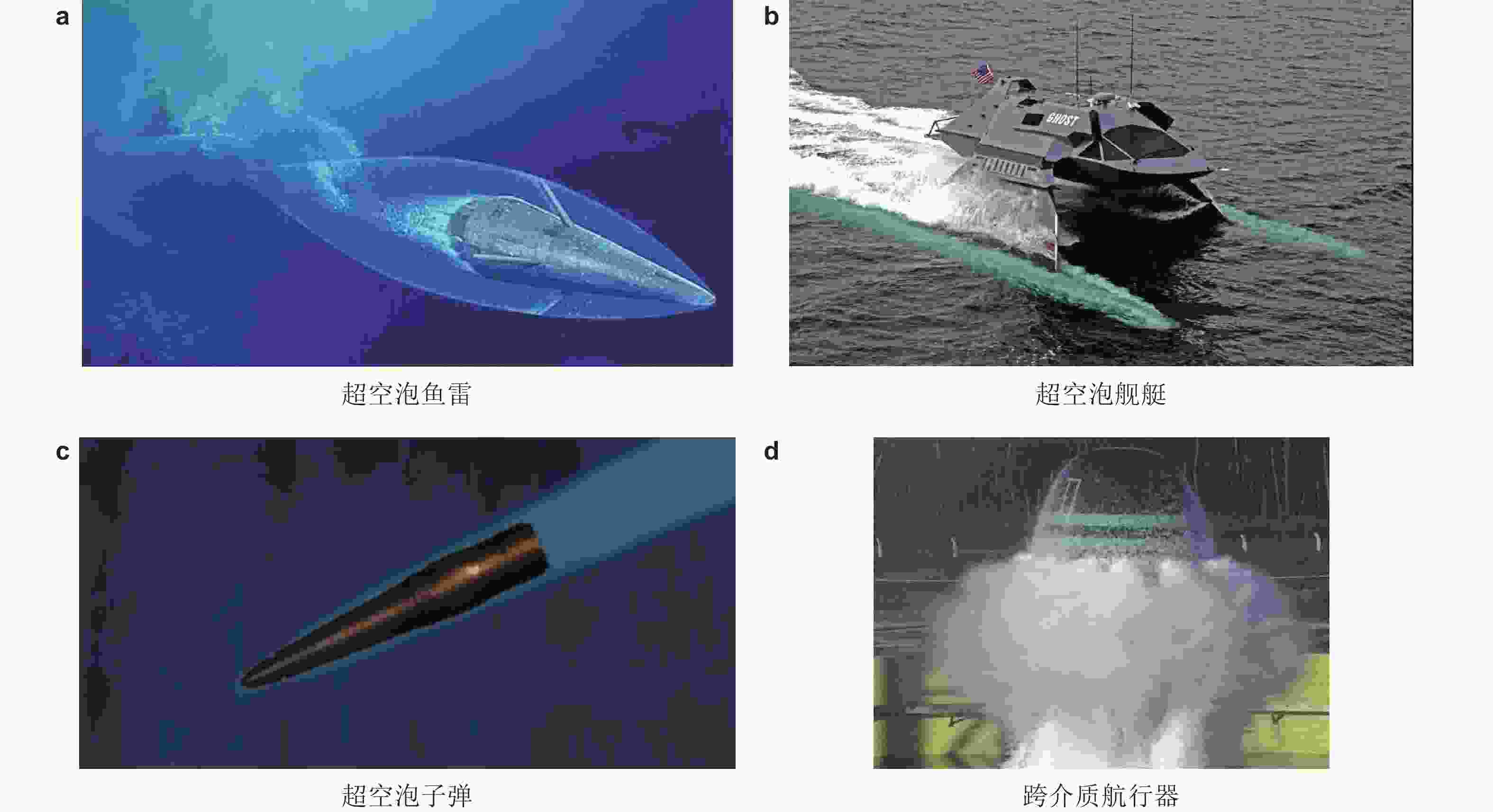
 下载:
下载:

